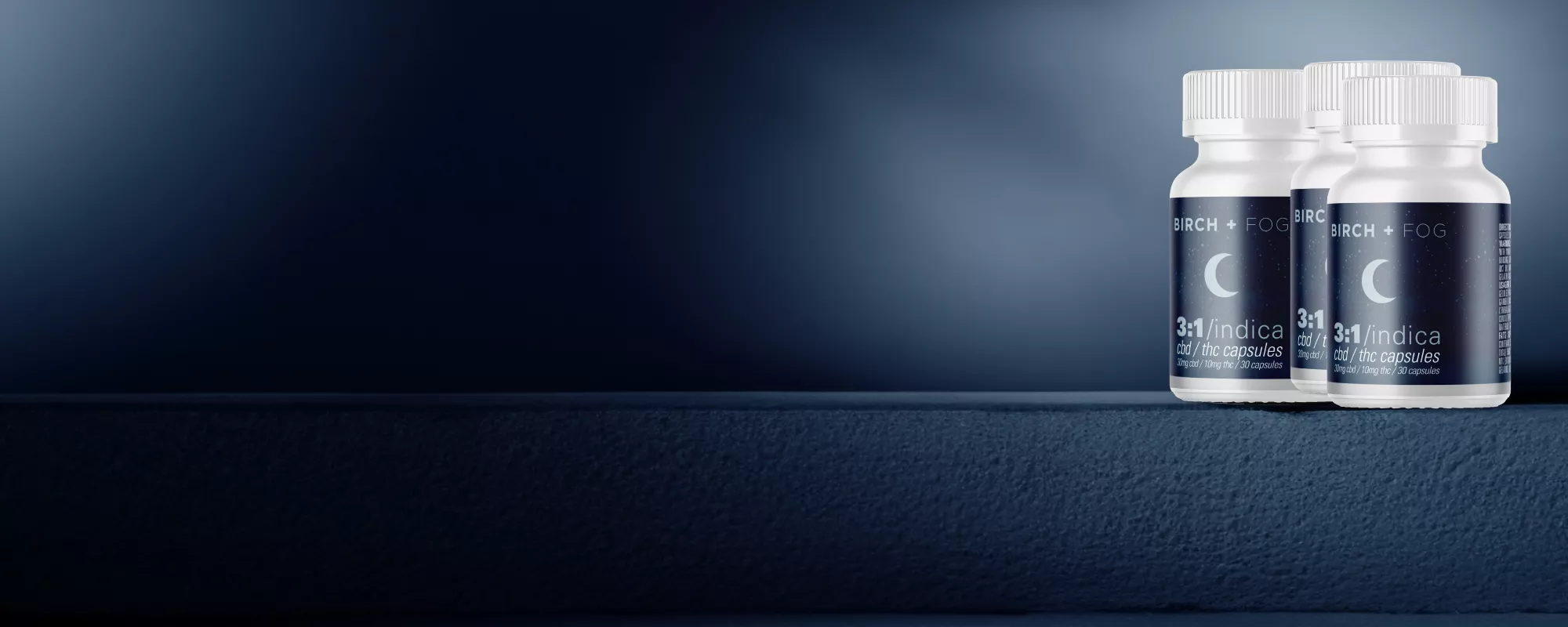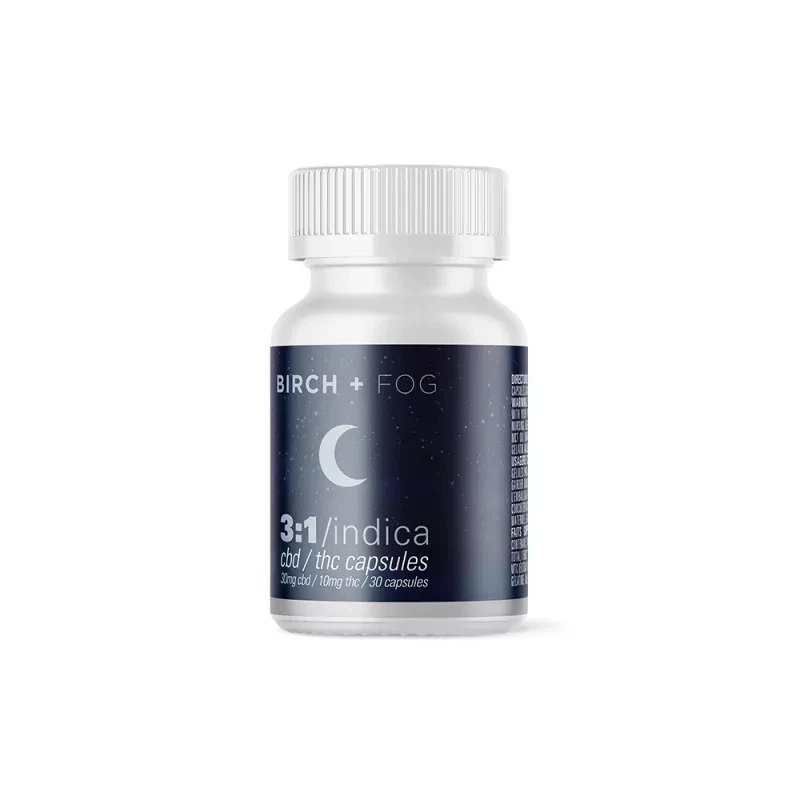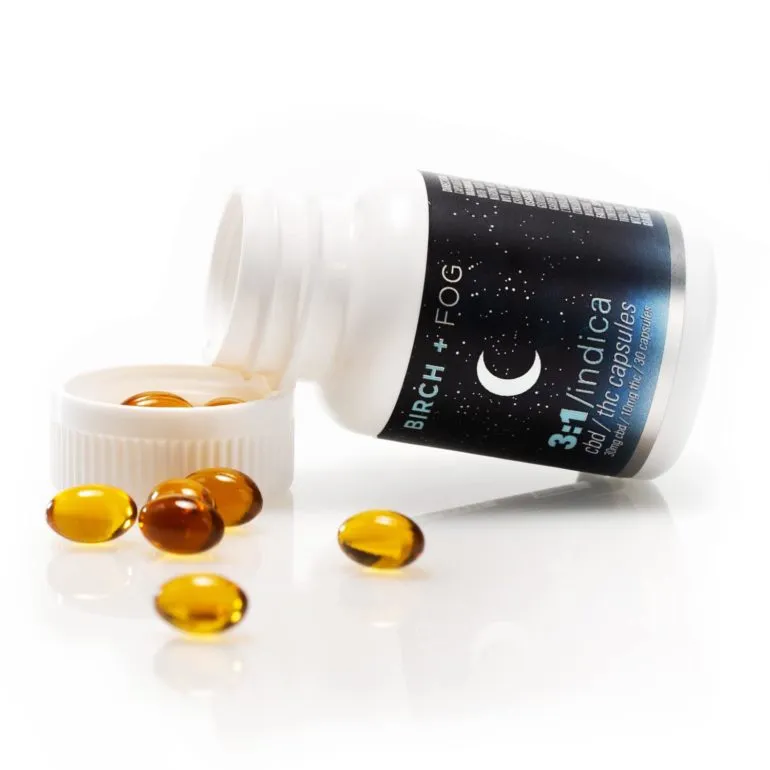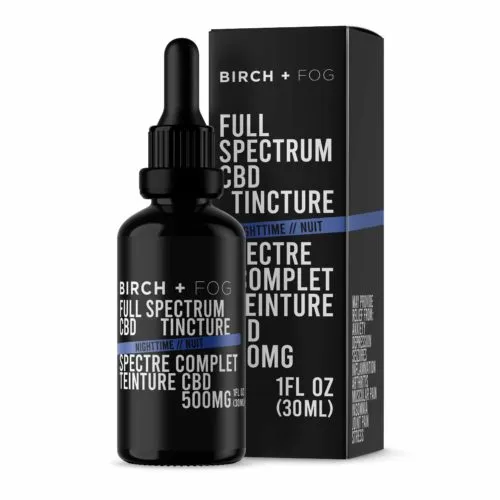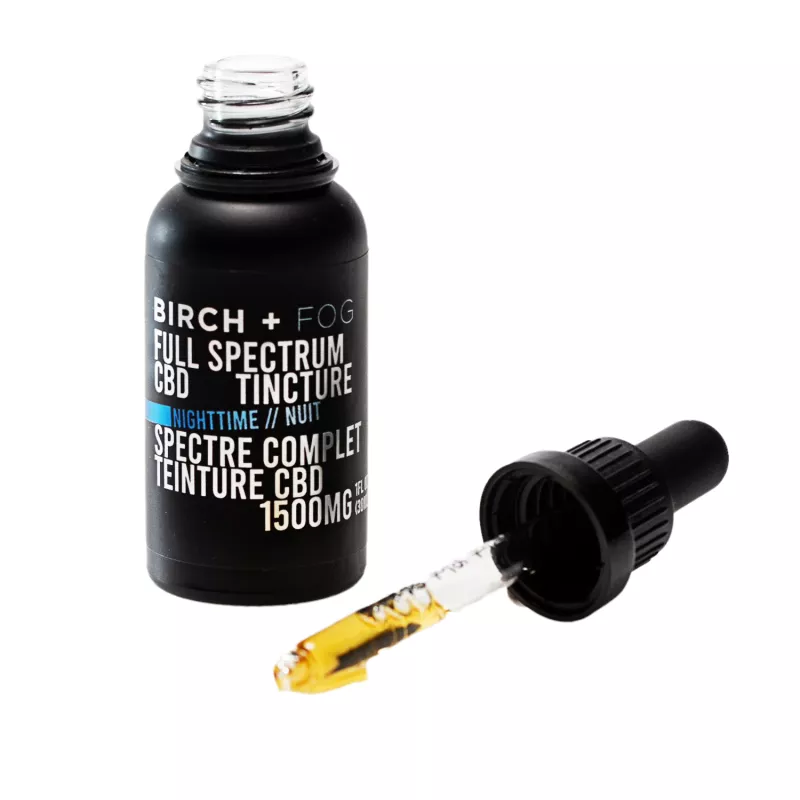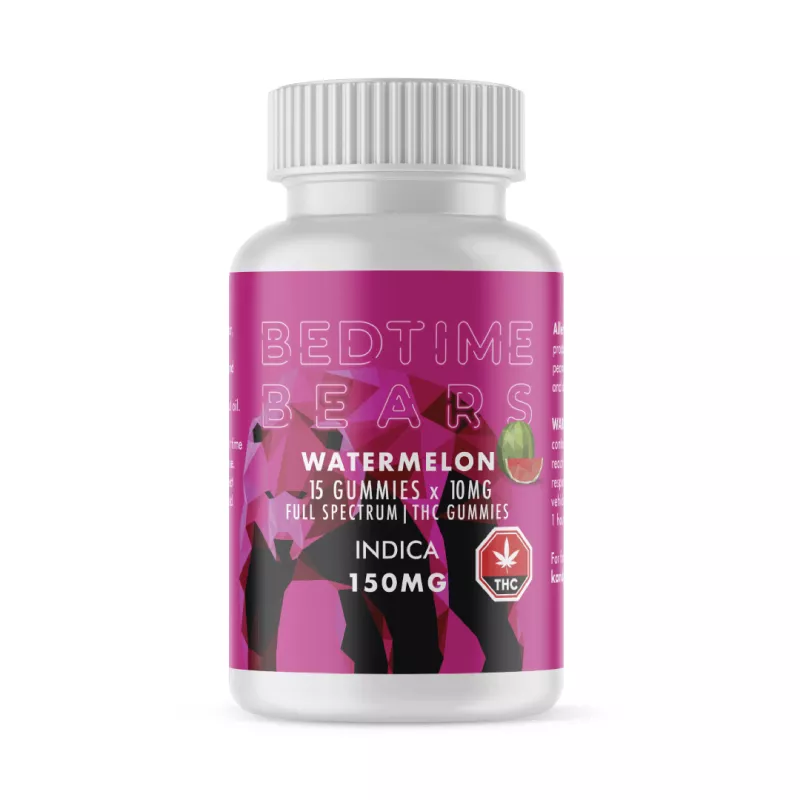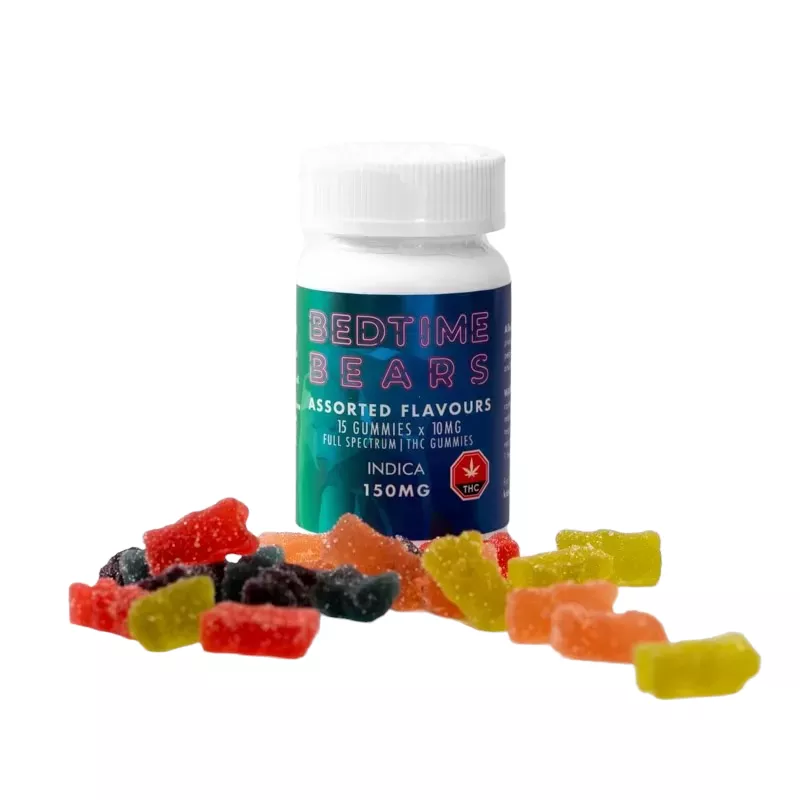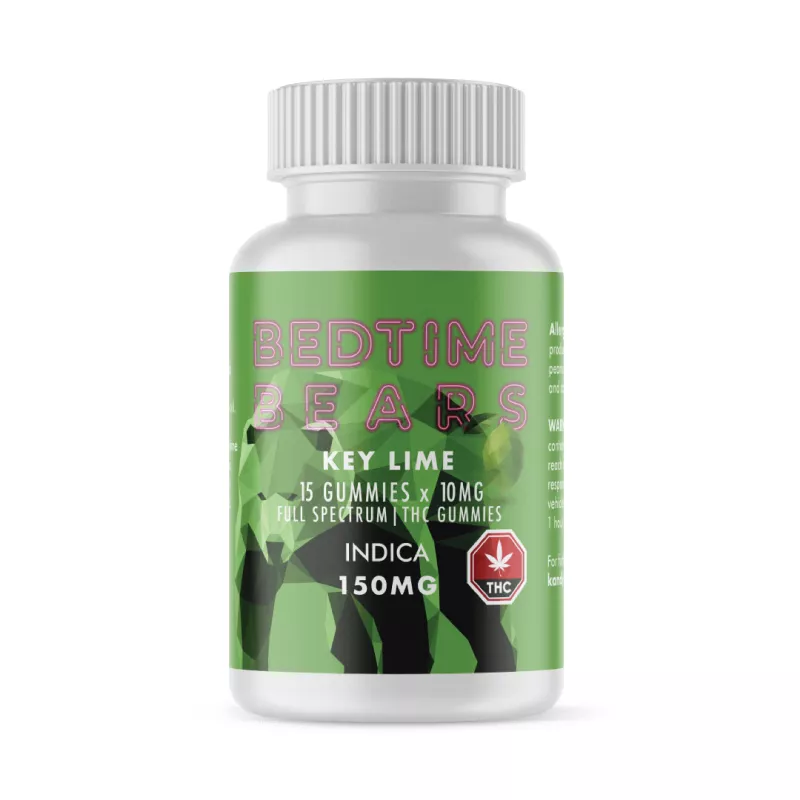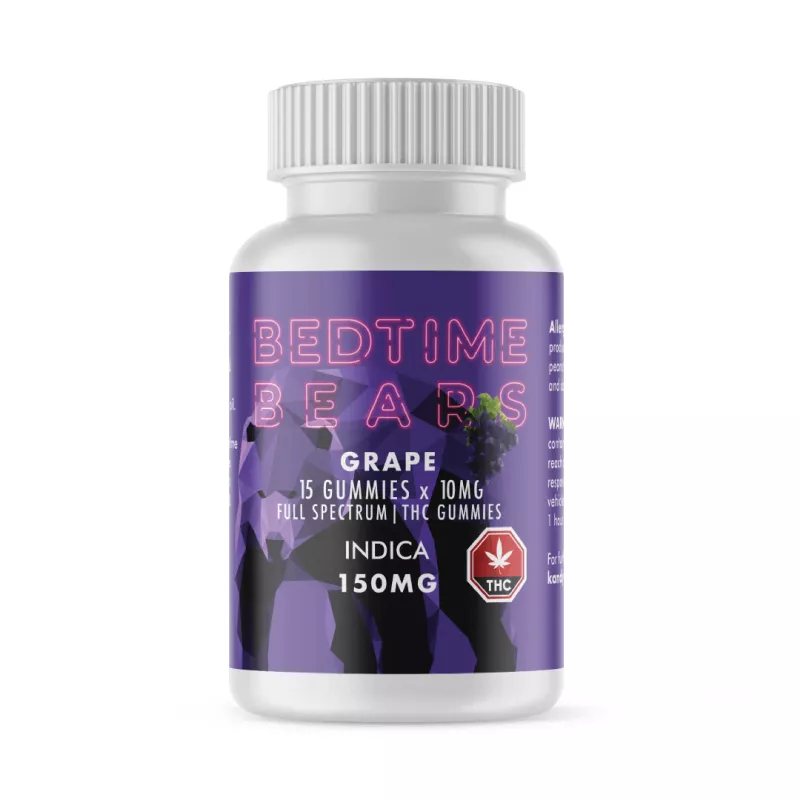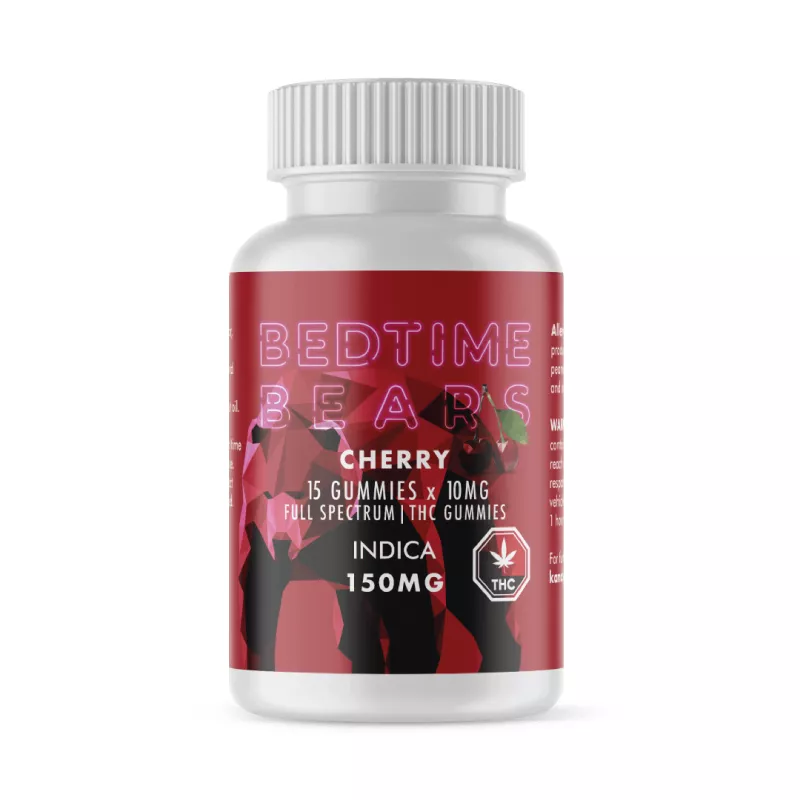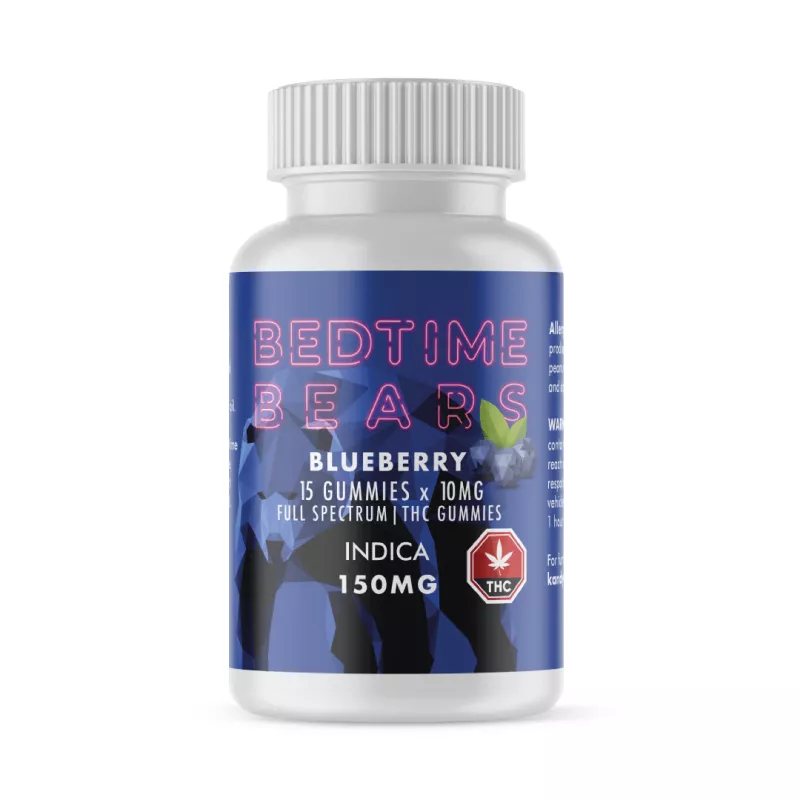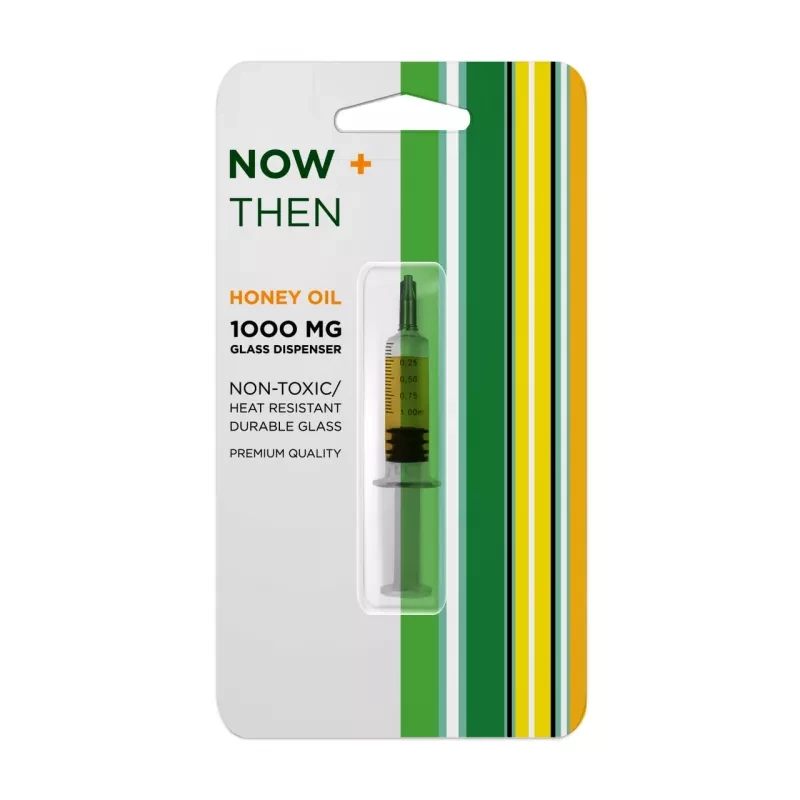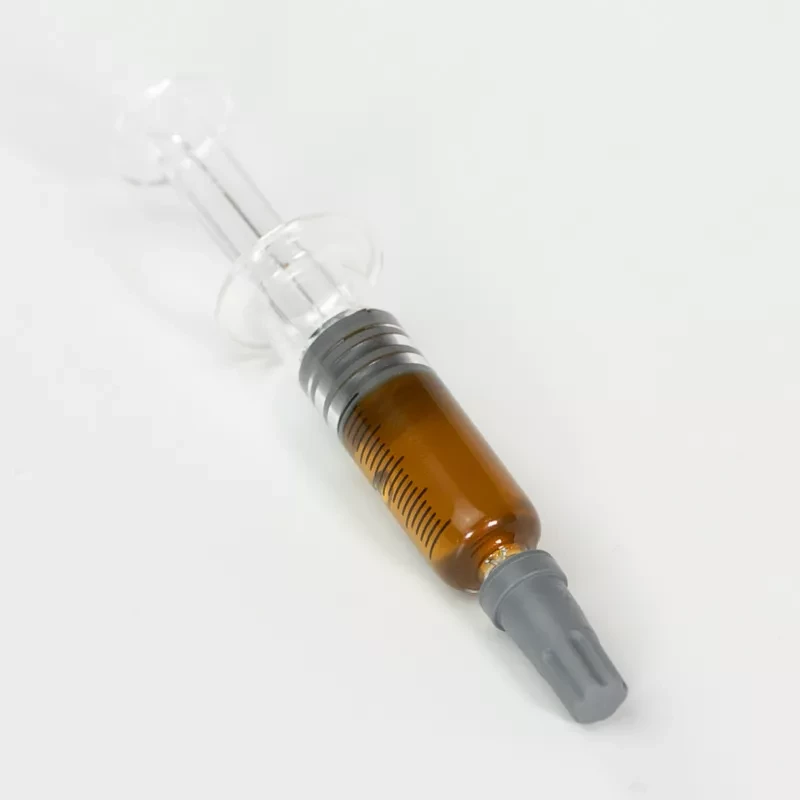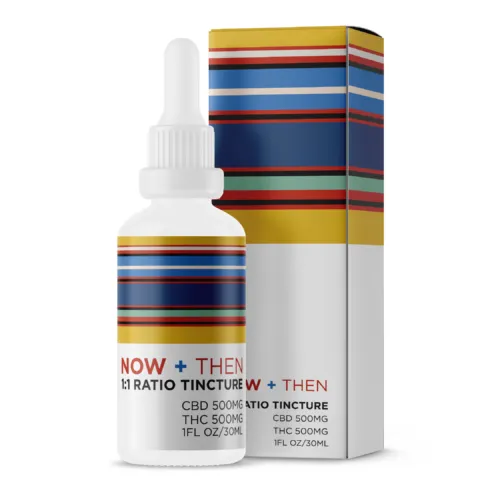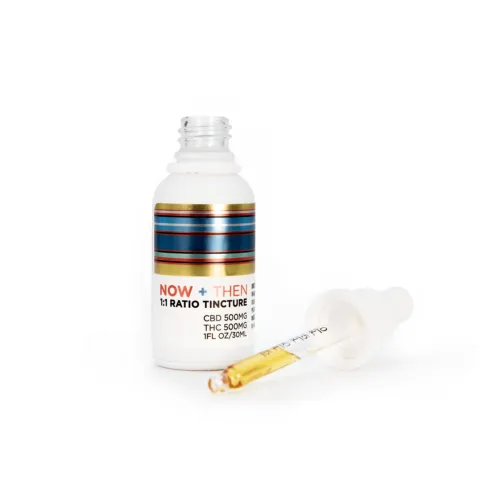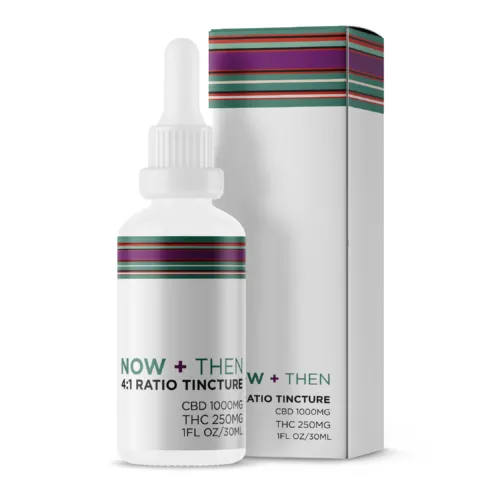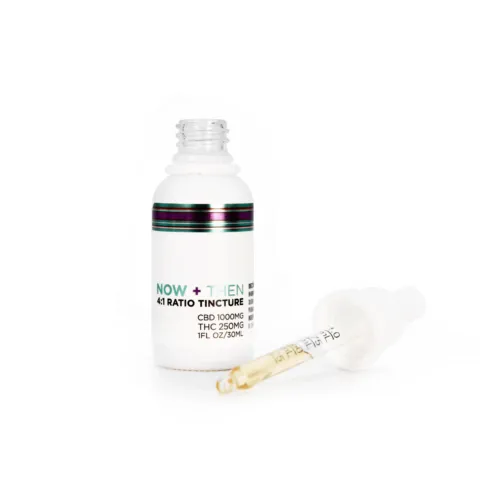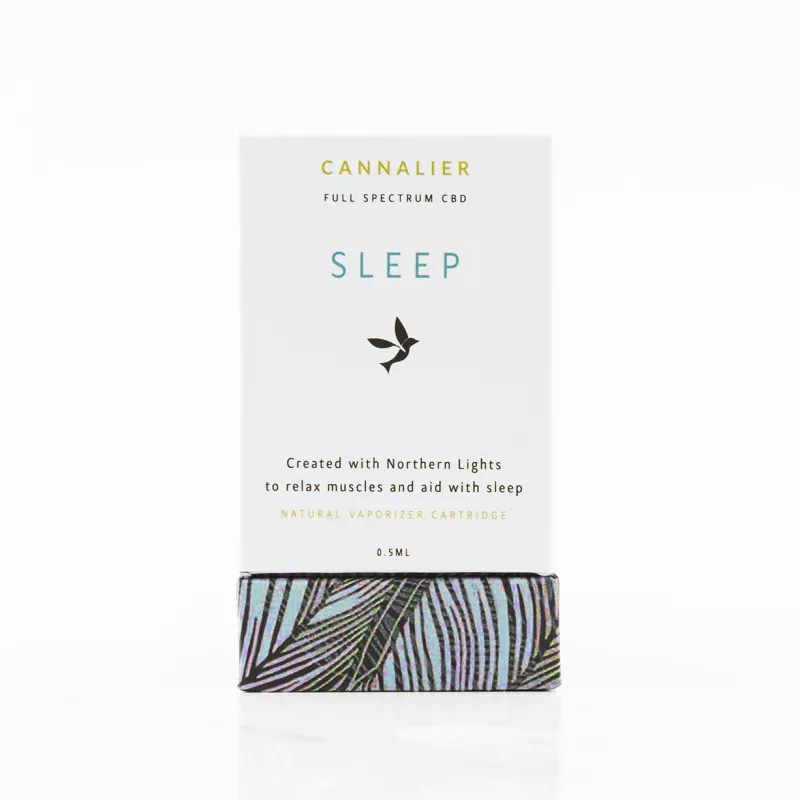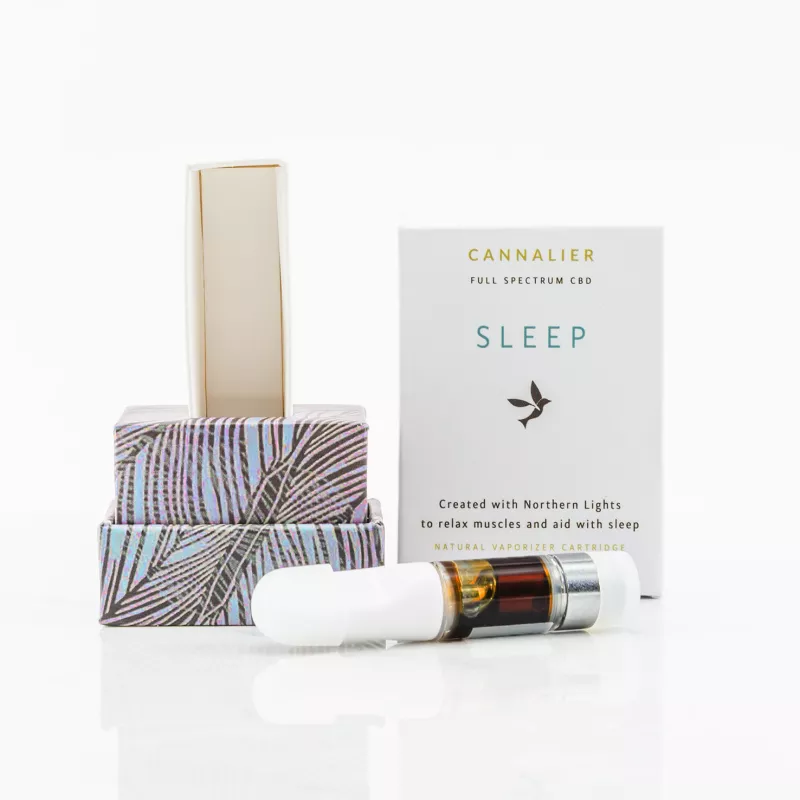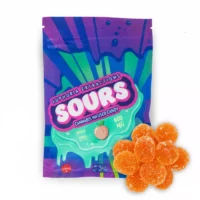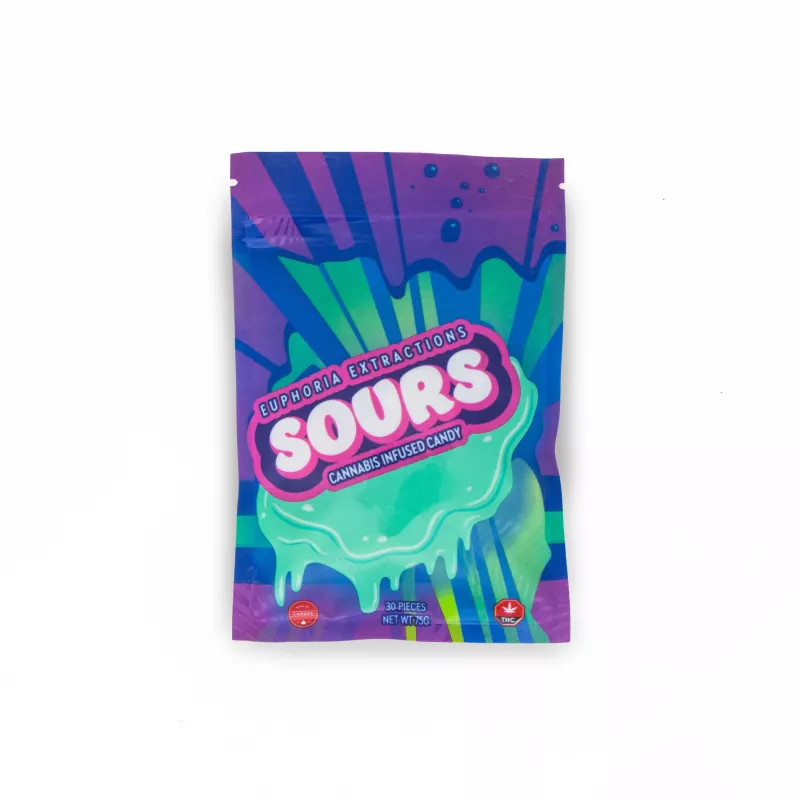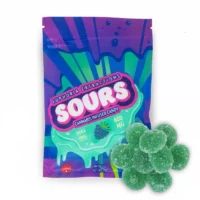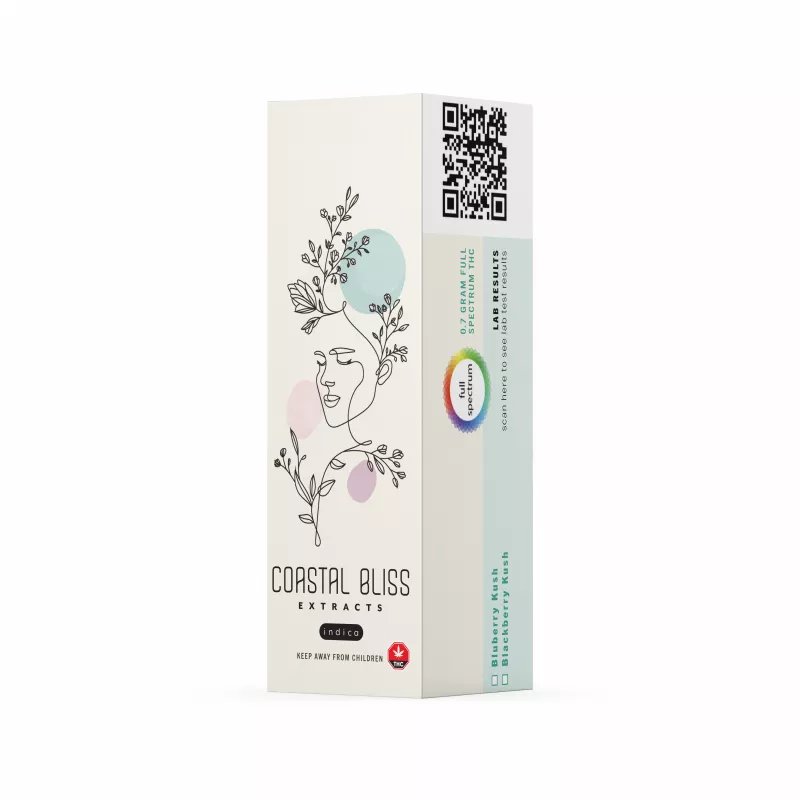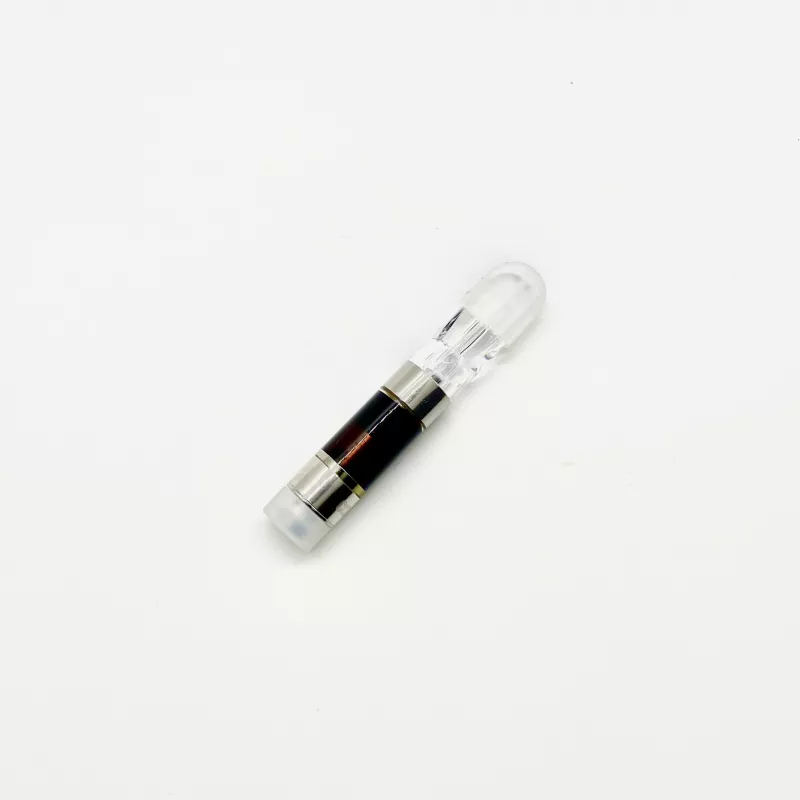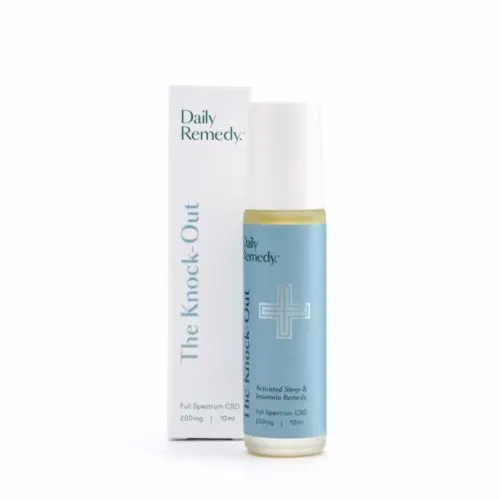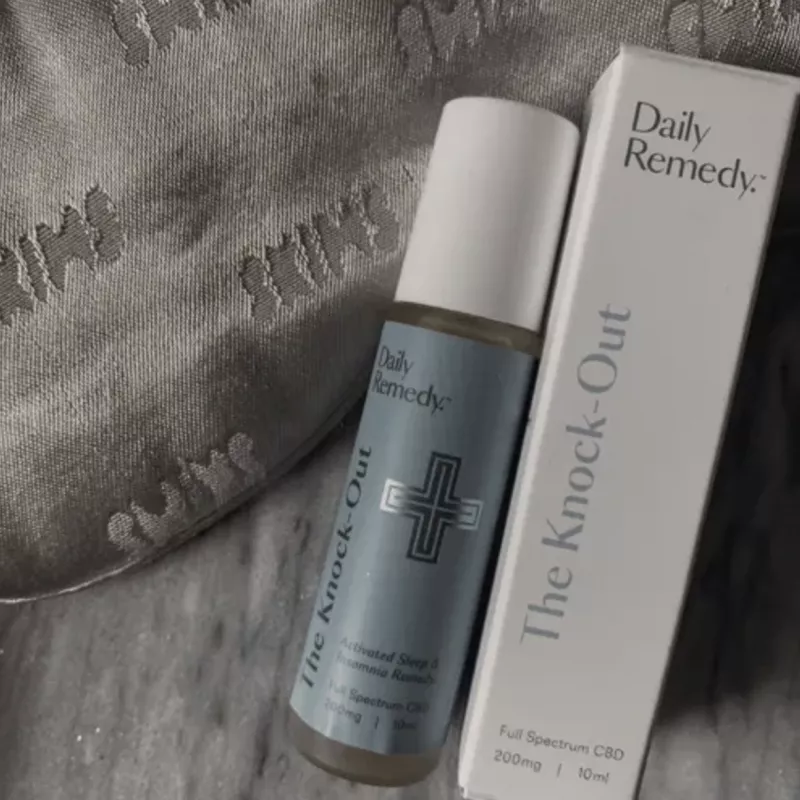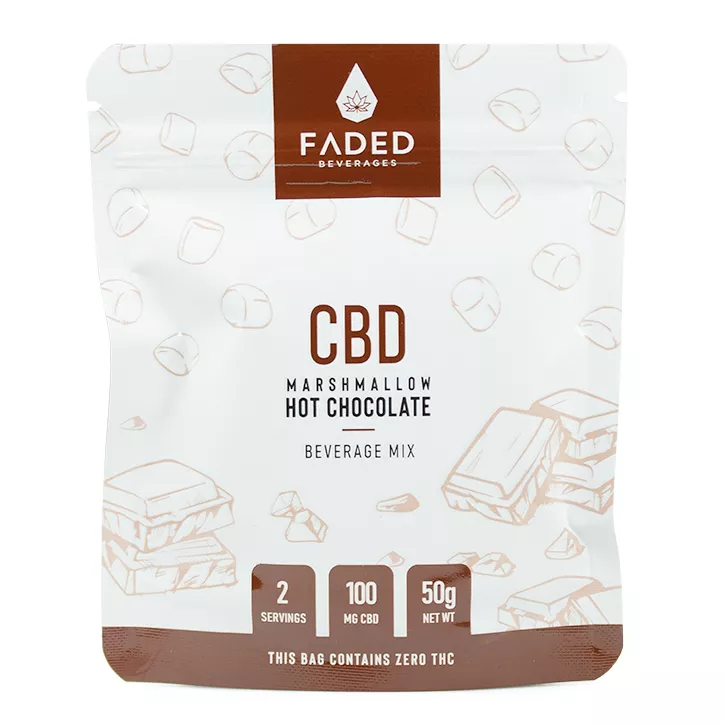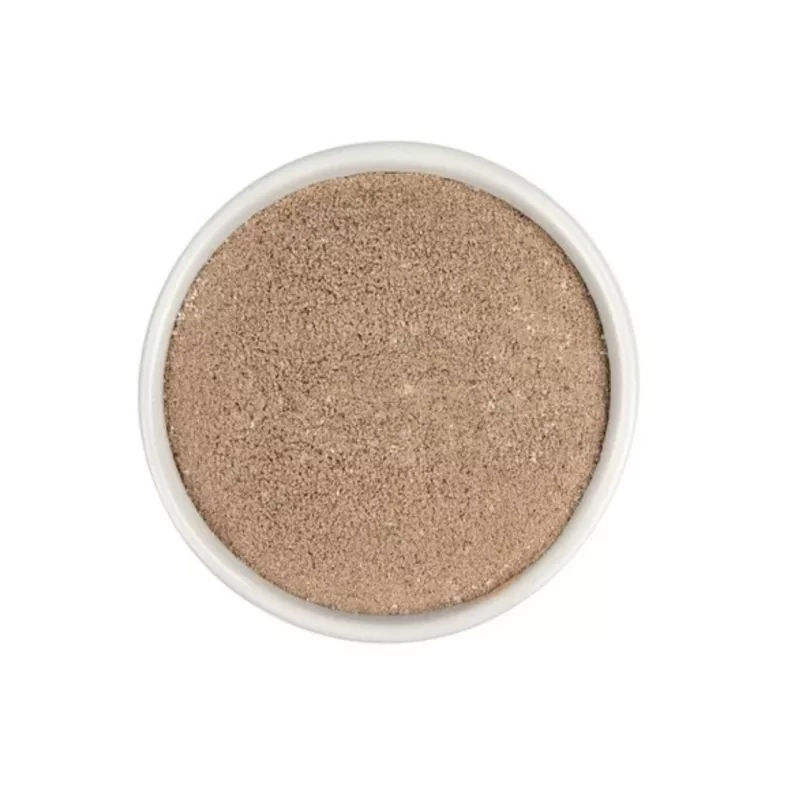CBD oil is considered safe and easy to dose, but when it comes to the effects, one might wonder if CBD can make one feel sleepy. CBD oil has been […]
- Shop All
- Type
- (144) THC>
- (75) CBD>
- Need
- Sleep>
- (21) Pain>
- (10) Anxiety>
- (6) Pets>
- (88) Edibles
- (14) CBD Edibles>
- (60) THC Edibles>
- (3) Ratio Edibles>
- (33) Hybrid Edibles>
- (87) Vegan>
- (5) Beverages>
- Strain
- (29) Indica>
- (24) Sativa>
- (47) Hybrid>
- (14) Tinctures
- (5) Anxiety Tinctures>
- (9) CBD Tincture>
- (1) Pain Tincture>
- (4) Ratio Tincture>
- (4) Sleep Tincture>
- (4) THC Tincture>
- (4) Capsules
- (1) CBD Capsules>
- (0) THC Capsules>
- (3) Ratio Capsules>
- Foggers
Shop for Sleep
-
Day + Night CBD Tincture Duo - Birch + Fog
THC 50mg | CBD 500mg$70.00 -
Cbd : Thc Capsules 3:1 Ratio | Night Time - Birch + Fog
THC 900mg | CBD 300mg$70.00 -
Full Spectrum Cbd Tincture | Night Time - Birch + Fog
THC 10mg | CBD 500mg$48.95 -
Watermelon Indica Gummy Bedtime Bears - Kandy Kandy
THC 150mg | CBD 0mg$25.50 -
Key Lime Indica Gummy Bedtime Bears - Kandy Kandy
THC 150mg | CBD 0mg$25.50 -
Grape Indica Gummy Bedtime Bears - Kandy Kandy
THC 150mg | CBD 0mg$25.50 -
Cherry Indica Gummy Bedtime Bears - Kandy Kandy
THC 150mg | CBD 0mg$25.50 -
Blueberry Indica Gummy Bedtime Bears - Kandy Kandy
THC 150mg | CBD 0mg$25.50 -
Honey Oil Glass Dispenser - Now + Then
THC 1000mg | CBD 0mg$30.00 -
1:1 Ratio Tincture - Now + Then
THC 500mg | CBD 500mg$60.00 -
4:1 Ratio Tincture - Now + Then
THC 250mg | CBD 1000mg$60.00 -
Sleep Cbd Vape Cartridge - Cannalier
THC 0mg | CBD 500mg$32.00 -
Indica Peach Sours - Euphoria Extractions
THC 600mg | CBD 0mg$38.00 -
Indica Blue Raspberry Sours - Euphoria Extraction
THC 600mg | CBD 0mg$38.00 -
Indica Watermelon Sours - Euphoria Extractions
THC 600mg | CBD 0mg$38.00 -
Blackberry Kush Indica Thc Vape Cartridge - Coastal Bliss
THC 500mg | CBD 0mg$30.00 -
Blueberry Kush Indica Thc Vape Cartridge - Coastal Bliss
THC 500mg | CBD 0mg$30.00 -
Sleep Aid Cbd Roller - Daily Remedy
THC 0mg | CBD 200mg$24.00 -
Cbd Hot Chocolate - Faded Edibles
THC 0mg | CBD 100mg$11.95
New to CBD?
Benefits of CBD
Types of CBD
Forms of CBD
CBD Dosage
CBD Instructions
CBD & Pets
New to CBD?CBD Sleep TipsCBD Sleep BenefitsCBD Sleep TypesCBD Sleep FormsCBD Sleep DosageCBD Sleep IdeasCBD Sleep FAQTop 20 CBD Sleep TipsThere are many reasons that influence how quickly we fall asleep at night, and the quality of sleep we have once we do. Stress, jet lag, a pre-existing health condition, the drugs you take, food you consume, schedule you keep (or break) or even the quantity of coffee you consume, can all contribute to insomnia, or the inability to get to sleep and to stay asleep. Other sleep problems, as well as mood disorders such as anxiety and depression, can also induce insomnia.
Many of us stay up late working or browsing through Instagram, and fail to turn off our devices until it is quite late. Blue light from screens should be avoided for up to four hours before bed. Even putting your phone down and turning off the TV an hour before you go to bed may make a big impact on how you sleep. Keeping a consistent sleep pattern might also help your body adjust to the habit and to begin shutting down on its own. Adding CBD to your daily routine will certainly help.
Create a nighttime ritual for yourself - a relaxing Lavender spray or oil diffuser, dimmed lights, a calming soundtrack - these can all help you to decompress after a long and stressful day. With CBD, a restful night is as close to guaranteed as naturally possible!
The top 20 questions related to CBD and Sleep
20 How do I take CBD for sleep?
CBD is available in four main forms including full-spectrum, broad spectrum, isolate and nano.
There are different benefits associated with each form of CBD so read through the sections on CBD forms to learn more about which may be best for you.
19 What type of CBD should I take to sleep?
There are CBD products available in everything from edibles to tinctures to roll-on balms and to capsules. Determine whether you prefer to have something on an ongoing basis, such as a capsule that you can incorporate into your day to day routine for lasting effects, or if you prefer something more fast acting if insomnia is not a regular concern for you.
18 Do I need to take CBD every night?
Cbd can be used daily as required, or if you typically sleep well but have the odd night of tossing and turning, then you can turn to a roller, vape or nano beverage for something a little more fast acting.
17 Do I need a prescription for CBD as a sleep aid?
No. You can obtain CBD from several online or brick and mortar dispensaries. It is worth having a few different delivery mechanisms on hand, until you determine your preferred method of ingesting, whether this is a combination of a few methods, and what the most suitable dosing schedule is for your needs.
16 Will taking CBD at night make me tired in the morning?
No. it is recommended that if you are using CBD as a sleep aid, that you try to consume it at least an hour before going to bed. This will give adequate time to ‘kick in’ and will help to ensure that you do not feel any after effects in the morning. Using a CBD isolate or a CBD product with low THC content will also help you to not only sleep well, but to still be alert when you rise in the morning.
15 Will CBD counteract coffee or alcohol?
No. If you have had too much caffeine or too much alcohol, CBD will not counteract their effects- ones that are often linked to sleepless nights. Consuming CBD on a regular, daily basis for example, particularly as a regular coffee guzzler, will however help to balance out the system and take effect on a longer term, vs nixing the effects of that red-eye espresso drink on the fly.
14 Will CBD give me nightmares?
We have yet to hear of, or find any, reports of CBD being directly linked to nightmares. In fact, as CBD has been known for its calming effects, antidepressant and anti-anxiety qualities, it is more likely that CBD will induce a more relaxing, restful sleep and not one interrupted by racing thoughts or sudden awakenings.
13 Will CBD roll-ons help put me to sleep?
Yes. Many people opt to use CBD topically and periodically to help them to sleep. These are best applied by rolling small amounts to the bottom of your feet, to your inner wrists or to your temple area. Despite the fact that CBD is not a medically-approved sleep aid, experts believe a little CBD added topically, might go a long way towards encouraging a more restful, stress-free night of sleep.
12 Can I take CBD with other sleep medications?
Always check with a physician when mixing supplements and prescriptions or other drugs. While we can not report on any adverse effects from combining a natural with a synthetic sleep aid at this time, we still recommend seeking the advice of a professional before self- diagnosing and self- medicating.
11 Can I use CBD daily for sleep?
Yes. CBD can be used daily as a sleep aid. It is available in several different forms such as in gummies, chocolates, tinctures or capsules. Explore a few different delivery mechanisms until you find the right one for you. With a growing number of flavoured tinctures available, you may choose for a few drops of a full-spectrum chamomile tincture added into a soothing, pre-sleep cup of tea.
10 How can I integrate CBD into my sleep routine?
Create a bedtime routine for yourself with CBD added into the mix. This is an easy way to get off the computer, put down your phone and start regulating your sleep patterns. If meditation is your thing, spritz your skin and bed with a relaxing lavender spray, lower the lights, and give yourself a mini-massage.
Taking a CBD bath with CBD Bath Salts or with a CBD Bath Bomb, which is said to work by being absorbed through your skin, is one of our favorite techniques. A nice bath combined with CBD might be just the ticket to dreamscape you've been looking for.
If you are not much of a bath person, try adding a few drops of CBD to a tea or a hydrating glass of water before bed.
9 Is CBD psychotropic?
No. CBD is a non-psychotropic cannabinoid found in the cannabis plant, that has been shown to have a variety of physiological and pharmacological effects including aiding in both falling asleep and having a restful, uninterrupted sleep.
8 Will taking CBD for sleep leave me feeling hungover?
No. Taking CBD as a sleep aid does not have the same morning after effects as consuming alcohol or prescription sleep aids. We recommend not exceeding the suggested dose specific to your body weight, past use, and manufacturing guidelines, and to take the CBD ideally one hour before bed.
7 Is it ok for me to combine multiple forms of CBD for sleep?
This is something for you to explore on your own. Many people take CBD capsules for example, on a regular basis, and then have tinctures or vapes or balms on hand for the nights where they may be more restless than usual. Having a CBD bath periodically will further the benefits and help lead you to a good night under the sheets.
6 How much CBD is good for sleep?
The patients in most clinical research on CBD and sleep were given anything from 25 mg to 1,500 mg of CBD per day. 25mg/day is a fairly common starting point for users new to CBD. It is advisable to start slow and low - gradually raise your dose until you discover something that works optimally for you.
5 How does CBD work to improve sleep?
Before we completely understand how CBD impacts our sleep, additional studies are needed. We know that CBD promotes sleep by addressing the underlying causes of insomnia such as chronic pain, anxiety, stress or other pre-existing conditions. We also know that CBD does work alongside the endocannabinoid system, in ways we go into in more detail in the CBD FAQ section of our site.
4 Is CBD safe for sleep?
Self-medicating sleep difficulties with CBD is an option for many people. Research on its effects is limited - particularly in the long term, though using CBD as a sleep aid looks to be generally harmless. Whether CBD helps individuals sleep is not clear to doctors, however much research shows that it may help people sleep better and longer, and that they are more focused and ready to tackle the day when they rise.
3 What are the effects of taking CBD for sleep?
CBD has been shown to have a calming effect on the nervous system, according to research. The serotonin system is also affected by CBD. People respond differently to different products, and the type and dose of the product have an impact on the outcome.
CBD doesn't make you feel "high," unlike THC. CBD in high doses does not generate THC-like effects, adn will not lead you to feeling groggy when used as a sleep aid. There are also few known withdrawal symptoms in patients who use CBD for short periods of time or periodically, as a sleep aid.
2 How do I determine if CBD is right for me?
You've probably heard about CBD. Many people are familiar with this product because they've read about it online or seen signage for local stores that offer it. Is it for pain relief? Is it for anxiety? Will it help with my insomnia?
For something that can be easily obtained online or from a supplement store, CBD's touted advantages appear almost too good to be true. However, there continue to be anecdotes and research studies that support the many inherent benefits of CBD. Do your own research. Speak with your friends. Consult with a physician. Explore a few products and judge for yourself whether the pros outweigh the cons. Monitor whether the CBD is in fact addressing your ailments or concerns.
1 Where can I get CBD for sleep?
CBD can be obtained by online ordering through our site or by visiting a dispensary in your neighbourhood. Be sure to check the brand guidelines and reviews for any products you choose to consume or ingest.Top 10 CBD for Sleep BenefitsEach and every one of us sleeps differently. If you are seeking ways to improve the quality or amount of time you sleep, then CBD in one or a few of it’s many available types and delivery mechanisms may be just what you are looking for.
First, ask yourself this question: Do you have difficulties falling asleep or staying asleep? It's important to choose a product that targets your specific concerns when using cannabis or CBD oil for sleep. Short-acting products can help you fall asleep fast, while long-acting products can help keep you sleeping or lead to the development of lasting sleep solutions. Before you start counting sheep, count-down the top ten (10) benefits of using CBD as a sleep aid.
These are our top 10 benefits of CBD for sleep
10 There are fast acting CBD products available
Insomniacs have trouble getting asleep or staying asleep at night. Daytime alertness, concentration, and mood are affected by this condition. People with insomnia who have a history of poor sleep may be anxious about obtaining enough sleep, which can lead to further restlessness at night.
Considering the possible benefits of CBD in the treatment of anxiety, it has been hypothesised that CBD may also help alleviate the anxiety associated with sleep disorders.
For those whose concern is falling asleep more so than staying asleep, a fast- acting CBD product formulated specifically with sleep in mind may be your best bet. CBD roll ons or balms, more commonly referred to as topicals, can be applied dermally to the bottom of the feet, temples or inner wrists to quickly quiet the mind and send you into sleep mode within minutes.
Alternatively, vaping a few puffs from a CBD pen will also provide a quick remedy when you are tossing and turning, struggling to fall asleep.
9 There are long acting CBD products to help you sleep better over time
If you want to fall asleep naturally, iCBD is a highly adaptable tool that you may use to assist manage your sleeping habits. To promote a more regular, and better sleeping schedule, opt for CBD products that are consumed daily, ideally at the same time (roughly one hour before bed), and that are designed to be slower release, and used on a long term, daily basis.
Your means of ingesting these may come down to personal preference, and there are countless options for delivery including daily-use tinctures, capsules, gummies and even teas. Pair one with a CBD bath bomb and over time you will notice significant improvement in how and for how long you sleep.
8 CBD for sleep will not cause drowsiness
A common misconception is that consuming CBD before bed, or during the day for that matter, will cause you to feel foggy or groggy in the morning. The key word there is misconception. Unlike THC, CBD does not induce severe sedation or feelings of fatigue the morning after consumption.
We do recommend taking it an hour or so before bed, and with longer acting CBD such as in capsule form, use it as a daily supplement so it has the chance to integrate with your operating system.
When it comes to alertness, CBD can really help you focus. CBD can also be viewed as an adaptogen. Your body's inherent rhythms are synchronised. After a long day, CBD can help you relax and sleep well.
Concentration and anxiety are improved by CBD's ability to boost serotonin levels in the brain. In other words, CBD won't make you drowsy, but it can make you more productive and help you sleep better.
7 CBD for sleep is not addictive
Due to the fact that CBD doesn't generate the same high as THC, experts believe that CBD's potential for addiction is restricted.
An analysis of THC and other cannabinoids conducted in 2011 indicated that CBD had a superior safety profile than THC. Scientists discovered that human volunteers tolerated large doses of CBD of up to 1,500 mg per day with little or no side effects. The study also found that CBD did not affect motor or psychological functions, nor did it cause any changes in blood pressure or heart rate.
It depends on where CBD oil originates from, as THC may be addictive and many CBD products include different quantities of THC. Be sure to check the form of CBD you are using to determine whether there are even trace amounts of THC present in the product, but rest assured that CBD, and in particular, CBD isolate, will help you to catch your zzzs without becoming addicted.
6 CBD for sleep does not give you nightmares
Many individuals are curious about how CBD will impact their dreams, as unpleasant nightmares may be unusual, upsetting, and even frightening.
Have you ever experienced a dream in which you lose all of your teeth? It's happened to a lot of individuals, and the interpretations of what the dream implies vary a lot. Some think it's due to a shift in your job life, while others (like Carl Jung) believe it's due to a sense of powerlessness. Whatever that implies, it's a strange thing to have.
These dreams may be distressing and, of course, unwelcome. Because of its common connection with cannabis, novice CBD users are concerned about the compound's negative effects. Will it, for example, have mind-altering effects? Or possibly give you nightmares?
Overall, there is minimal indication that CBD oil causes nightmares or terrible dreams (and we have found no scientific data to back this up). While there have been several accounts of people having strange or even elevated, detail-rich dreams after taking CBD, there is no evidence that CBD is to blame.
5 CBD for sleep comes in several delivery mechanisms
CBD has been linked to a reduction in anxiety levels in studies, and many users report that they fall asleep faster while using the substance. According to several studies, sleep quality can be enhanced, resulting in a greater sense of being refreshed and more energy when you wake up.
There are several different options available for ways to consume CBD as a sleep aid, and you may choose one or a combination thereof. CBD for sleep is available in long-acting formulas, delivered as edibles, tinctures or teas, or as fast-acting formulas such as topicals or vapes. As mentioned, it is worth establishing what type of sleep ailment or disorder you are trying to treat and where it may be rooted, in order to determine the best CBD sleep program for yourself.
4 CBD for sleep helps with generalized anxiety
Several types of anxiety, such as social anxiety disorder (SAD) and post-traumatic stress disorder (PTSD), may benefit from the use of CBD. It may also aid in the treatment of anxiety-related sleeplessness.
CBD's effects on patients with SAD were investigated in a 2011 study. A 400 milligramme (mg) dosage of CBD or a placebo was delivered to the participants. Those who were given CBD had lower anxiety levels overall and reported better sleeps.
CBD has been found in several recent studies to aid with PTSD symptoms such as nightmares and reliving bad memories. For optimum results with generalized anxiety, or a level of anxiety that seems to be affecting your sleep, opt for CBD as a long- acting solution, one used daily as a dietary supplement. You can also rely on CBD fast-acting solutions such as topicals or vapes for a more fast acting approach.
3 CBD for sleep does not require a prescription
It is advised that you have a valid medical cannabis prescription/authorization to consume medicinal cannabis before purchasing CBD oil. At minimum, we recommend consulting with a physician when taking any supplements or medications as sleep aids.
It is important to get to the root of why you are not sleeping well and then to determine whether CBD may be right for you. There are also different forms of CBD available, including full-spectrum, broad-spectrum, isolate and nano, some with traces of the psychoactive ingredient THC, and some without. Do your research into the many different options available, understand what it is you are trying to address- difficulty falling asleep or difficulty staying asleep and then determine which CBD sleep product may be most suited for you.
Whether through online ordering or purchase through your local dispensary, there is undoubtedly a broad selection of products available without a prescription that will help you when it comes to both obtaining and managing your zzzs.
2 CBD for sleep is available in many forms
If you're wondering how to choose the finest CBD sleep products, it's not a simple process. There are a lot of high-quality CBD products on the market, so picking out the best sleep alternatives may be difficult. However, the following are some of the criteria here that may be helpful. Plus, take the time to explore a few different options, the decision over a tea vs a capsule vs a gummy is a rather subjective one, and best come to by trying a few and determining for yourself which you prefer.
The most important aspect in determining which form of CBD to use as a sleep aid is third-party lab testing. Consumers are protected by independent lab testing, which reveals exactly what's in the product you're buying.
Look for clear, easy-to-read labelling. We want to examine the whole list of components, as well as the weight, serving sizes, advised dose, manufacturing location, and other relevant information.Customers may be kept satisfied in a variety of ways these days, from an easy-to-navigate website to a flawless checkout process. Consider how prompt customer service is, read through the user reviews and ensure that you can contact them if you have a problem.
The market reputation of a brand says a lot and many brands have a full product line up including several forms of CBD delivery, so once you have found a brand you deem to be reputable, take the time to explore both the fast-acting and long-acting products they offer for sleep. You may find the perfect fit, and that fit may include a combination of edibles, tinctures and beverages, all designed specifically as sleep aids.
1 CBD baths will help you to relax before bed
The modern world is full of distractions that might keep a person awake at night, yet sleep is more vital than ever before. In order for your immune system to operate properly, you need to get adequate rest. It's also important to have adequate sleep, which is tough to get with synthetic sleeping medications.
A lot of factors may interfere with it, even without the ominous headlines. Poor sleep patterns and chronic pain are two of the most frequent health problems in the United States today. Both difficulties may be addressed by incorporating a CBD bath bomb into your evening regimen.
CBD bath bombs are designed to promote deep relaxation and tranquility, allowing for a restful night's sleep. Brands often incorporate essential oils also known to promote better rest, including those from frankincense, orange, chamomile and lavender, all of which are known to assist in relaxing muscles and soothing the mind.CBD Types for Sleep disordersHealth and well-being depend on a good night's sleep. Adults should sleep seven to nine hours every night, according to experts, allowing them to wake up refreshed and with enough energy for the following day. Restful sleep also aids in memory development, muscle and tissue growth and repair, and disease prevention.
For certain types of sleepers, it might be difficult to fall or stay asleep. Seventy (70%) percent of North Americans say they don't get enough sleep, and nearly one-third report sleeping fewer than six hours each night. It is possible to improve sleep and prevent sleep debt in several different ways. Improved sleep hygiene, pharmaceutical sleep aids, and natural sleep aids are all possibilities. Here we explore a budding natural sleep aid, CBD (cannabidiol), available in several different forms, including full-spectrum and isolate.
Cannabidiol (CBD), a cannabis derivative, is becoming increasingly popular as a way to sleep better. CBD is frequently used to enhance sleep and reduce anxiety. It also has anti-inflammatory properties.
There are several different types of CBD available for you to explore with which to ensure that you doze off peacefully, and that you have a full and restful sleep. You may have come across terms such as full-spectrum, broad-spectrum, isolate and nano.
Each of these different types of CBD is used to target specific ailments, and when it comes to sleep aids, the subtle differences in each could lead you to pick one over the other. Often those new to using cannabis products will begin with a CBD isolate, as those are free from any traces of THC. You will certainly find a range of products from edibles to topicals, that implore these different types of CBD. Here we go into detail on what each is best used for, and what they actually are.
The top four (4) types of CBD for sleep
4 Full-spectrum CBD
A full-spectrum cannabis product is one that contains all 113+ cannabinoids. In other words, the total influence of full-spectrum oils is greater than the individual portions. Recent study shows that the therapeutic advantages of cannabis are increased when the whole plant is used, rather than CBD or THC being isolated.
It is composed of cannabinoids, such as cannabinol, among other components. Full-spectrum CBD products may include up to 0.3 percent tetrahydrocannabinol (THC), the psychoactive cannabinoid found in cannabis plants.
There is leftover THC in this cannabis oil since it is made utilizing all of the cannabinoids. It is not enough to cause psychoactive effects such as feeling high, and seldomly, those who are very sensitive to THC may experience these effects.
Full spectrum CBD may improve sleep quality and aid with insomnia. Some of the cannabinoids in our full-spectrum extracts assist relieve drowsiness induced by common aches and pains associated with exercise or ageing. In addition, they assist to reduce tension and promote relaxation, while fostering a healthy stress response. There are a range of potencies and flavour profiles available in everything from gummies to bath bombs, so there's much to discover.
Many full-spectrum CBD oils include CBN, another cannabinoid in the cannabis plant, one that is thought to have sleep-enhancing, sedative properties. Full- spectrum CBD oils are thus a suitable choice for those looking for a specialized remedy to enhance their sleep quality and add hours to their sleeping schedule.
3 Broad-spectrum CBD
Simply defined, broad-spectrum CBD is full-spectrum CBD without THC. As a general rule, that's the way it's framed. There are other CBD products that incorporate even one extra cannabinoid in addition to CBD that utilize this term.
As a result of chromatography, full-spectrum CBD is produced. Due to the removal of THC from the extract, a wide range of cannabinoids, terpenes, and other chemical components remain.
When it comes to its use as a sleep aid, we can not overemphasize the positive effects associated with choosing a broad spectrum CBD oil. Consider a broad-spectrum product if you're interested in its therapeutic properties, especially if you want to avoid the euphoric effects of THC, even in the tiniest amounts.
It is possible to try several different types of CBD oils by simply testing out the various delivery mechanisms and oil types. You may find that you prefer to consume CBD on a daily, regular basis, or that you like to organize a night of relaxation rituals for those tough to drift away times. Consider the teas, topicals or bath bombs for such a night.
2 CBD Isolate
Isolate of CBD is a chemical component found in cannabis plants called cannabidiol. The psychoactive component of cannabis, THC, is absent from CBD isolate products. For individuals who wish to test CBD but cannot or do not want to swallow THC, CBD isolation is a viable choice.
CBD Isolate is a crystalline solid or powder that contains only CBD and no other compounds or substances. A full-spectrum CBD product can legally include up to 0.3 percent THC, but CBD isolate will not have that capability.
Producers utilize a variety of extraction methods to create CBD isolate. Pure CBD crystals are left behind as a result of this procedure. The crystals may then be ground into a powder by the manufacturer to make the product simpler to ingest. No characteristic smell or flavour distinguishes CBD isolation.
Studies indicate that the 5-Hydroxytryptophan (5-HTP) serotonin receptor may also be affected by CBD. In addition to affecting moods and sleep patterns, serotonin has been linked to sadness, anxiety and insomnia. As a result, some people may find CBD to be calming and soothing and find great results when using it as a sleep aid.
CBD isolate has certain distinct health advantages. Some of them, however, may have less of an effect than a full-spectrum CBD product would. Only at a certain level, according to the study's findings, is CBD isolate helpful against pain and inflammation. If chronic pain is the culprit behind your sleepless nights, a CBD isolate could well come to the rescue.
CBD isolate is also a viable choice for those who must abstain from THC or who do not require the benefits of the entourage effect, one more commonly associated with a full-spectrum CBD product.
How does the entourage effect work?
Cannabis chemicals other than tetrahydrocannabinol (THC) are said to function synergistically with THC to regulate the plant's euphoric effects.The flower is what we most typically associate with when it comes to using cannabis.
Cannabis flower, like any other flower, has a distinct aroma. Cannabis has, give or take, 120 terpenes. THC and CBD co-exist in the plant, however CBD is not psychoactive as is THC. Certain terpenes are only present in cannabis, whereas others are found in a multitude of other plants.
However, it's not only about the fragrance of the plant. As well as medicinal qualities, terpenes contribute to a plant's therapeutic benefits. Encouraging cannabinoids to reach the bloodstream through the entourage effect, allows them to interact most effectively with our endocannabinoid system.
Cannabinoids are absorbed more quickly when myrcene is present, for example, since it enhances cell permeability. Serotonin levels are raised by limonene, which impacts our mood and sleep cycles. Because these terpenes can affect neurotransmitters in our brain, various strains of cannabis may have varied impacts on our regulatory systems.
The phrase "Entourage Effect" was coined in 1998 to describe the biological synergy of cannabinoids, flavonoids, and, of course, terpenes. All of these chemicals, according to Chris Emerson, interact together to create "the magic or power of cannabis". They act together to generate greater effects than any cannabinoid could accomplish on its own.
In fact, this symbiotic relationship between cannabinoids and terpenes is what gives cannabis its unique abilities. To make the most of this entourage effect, and when researching which form of CBD may be most beneficial for you on your quest for restful nights, keep in mind that your experience may be optimized when using a full- or broad-spectrum CBD product, that puts this entourage effect into full force.
1 Nano CBD
Nanotechnology is often abbreviated to nano when attached to CBD products. Molecular nanotechnology refers to manipulating objects at the lowest possible scale.
The cannabis plant's aerial portion contains CBD (cannabinol). It is estimated that the cannabis plant has as many as 150 cannabinoid molecules. This number varies from study to study. Both CBD and THC (the psychoactive cannabinoid) are among the most widely known of the cannabinoids present in the cannabis plant.
For better absorption into the bodily cells, nano CBD is emulsified. In order to alleviate pain and inflammation, many active persons, particularly athletes, have switched from pharmaceuticals to CBD. This is true amongst those struggling with sleep disorders, restlessness, and those with difficulty falling asleep or staying asleep.
Due to the nano CBD's tiny size, it is simpler for the body to absorb it. Increasing the surface area of absorption makes nanoparticles more bioavailable. Refer to our FAQ sections to discover more about bioavailability, and why this is something to consider when selecting the best CBD sleep aid for you.
Nanotechnology breaks down CBD molecules, resulting in nano CBD particles that are small and easily absorbed into the circulation. Nano CBD's bioavailability and speed of action are enhanced due to the nanoparticles' increased absorption area.Gummies, soft gel, drops, or topical applications of normal CBD may take longer to provide the desired effects. Nano beverages are a great option for consumption an hour or so before bed, to catapult you into a zen state of mind before bed.
CBD and Insomnia
In a recent study, after the first month of taking 25 mg/day of full-spectrum CBD, 79.2 percent (79.2%) of patients who suffered from insomnia or anxiety felt less anxious, and 66.7 percent (66.7%) slept better. The CBD was well accepted, tolerated by all patients, with the exception of three who reported negligible adverse effects.
Cannabis and cannabinoids are "ancient medicines" but are ones that are "promising new therapeutic strategies for pain management," according to an article released by the National Institutes of Health. A growing number of CBD products formulated specifically for sleep are appearing through online retailers and dispensaries nationwide.
Many CBD users report falling asleep more easily and waking up feeling more refreshed after using the product than they did before. The Journal of Clinical Pharmacology revealed that individuals who took up to 160 mg of CBD reported sleeping more than those who took a placebo, and expressed a greater feeling of rest, and uninterrupted nights.
Other consumers take CBD to decrease anxiety, and it may assist Parkinson's disease sufferers with REM behaviour disorder. Many individuals use CBD to help them sleep, which is not unexpected. As well as reducing stress, social anxiety and depression, it has shown some promise. Serotonin receptors in the brain are thought to be the site of CBD's interactions, according to researchers.
Melatonin is one of the classic sleep aids, and some producers are also creating CBD products in conjunction with it. Again, try to determine the cause of your sleeplessness, insomnia, anxiety or difficulties falling asleep. Having a clear understanding of what may be causing your restless nights may be the best place to start to lead you to the remedy that is most suited to addressing the ailment(s) that keep you up at night.Top 5 Forms of CBD for SleepCBD is available in a variety of forms, including capsules, tinctures, topicals and vapes, Typically, it is taken from the cannabis plant and turned into an oil, which is then consumed. When it comes to sleep difficulties, understanding how each way of consumption works, (commonly referred to as a delivery mechanism) can help you choose how to employ each technique.
These days, CBD consumers have an almost overwhelming amount of options.
CBD oil can be ingested directly but as the most flexible and ubiquitous product on the market, CBD oils are at risk of losing their position as the 'product of choice' for most people. Why not when one could nibble on a gourmet CBD chocolate instead?
CBD oil may also be consumed by placing it on the tongue and swallowing it, or sublingually. CBD foods are also gaining popularity among CBD consumers and CBD oil can be added to almost any meal you prepare at home, such as to salad dressings or teas.
One of the simplest and most successful approaches is to use a CBD oil tincture, which is absorbed straight into your bloodstream when placed under your tongue. The pulmonary system (lungs) and the digestive system are bypassed in this route of administration, which might reduce the intended effects of CBD.
In addition to the two systems discussed above, the digestive system—and in particular the liver—is highly good at diluting substances that pass through it. These blood arteries are near to your brain, so CBD oil does not pass via your lungs or liver. This allows it to keep more of its original strength. This is the best method to take this medication, according to our experts.
In addition to sweets, CBD capsules and tablets are other convenient ways to consume the substance. Pain can also be relieved quickly by using CBD cream or topicals to the region in question. Let's have a closer look at the common forms of CBD that are used specifically when it comes to sleep.
The top 5 forms of CBD for sleep
5 CBD Edibles
An edible product is one that you ingest, or consume. Eating something that includes CBD or THC is what the term edible has traditionally been used to refer to. As an example, when most people hear the term edible, they picture space cakes and pot brownies in their minds. CBD edibles, on the other hand, are a completely different animal.
First of all, CBD is not intoxicating. Contrary to THC, it does not create a psychoactive high. As cannabinoids, THC and CBD are both present in and generated by cannabis plants. THC is known for generating the high that recreational consumers feel and or fear, when they consume cannabis.
CBD, on the other hand, is a harmless, non-intoxicating and incredible healing compound that is readily available. CBD is believed to provide a number of health advantages, and is utilized in a variety of ways. This cannabinoid may have an influence on the body's endocannabinoid system (ECS), which may help with conditions such as inflammation, anxiety, chronic pain and sleeplessness.
CBD edibles are available in the form of chocolates, gummies, hard candies, cookies and brownies. Several of these are made with added ingredients such as sugar, flavour, gluten, butter or cocoa, some users opt for this method of ingesting on special occasions only, and turn to one of the other forms for more regular, day to day use.
CBD edibles are significantly different from CBD oils in that they are ingested- edibles are consumed whole.Considering that CBD is absorbed differently in oils and edibles, consumers may notice a variation in the time it takes for the CBD to take effect.
CBD-infused gummies are exactly what they sound like. However, they may also be circles, fruits and other forms. These tasty CBD gummies come in a variety of flavors. As an alternative, you can cut each gummy into smaller portions to lessen the dosage.
When it comes to workouts, CBD is commonly utilized. Gym-goers will appreciate CBD protein bars, which are packed with protein and CBD. Try CBD dried fruit as a healthy alternative to sweet CBD snacks. Products like these are getting more and more popular as more fruit alternatives become available. For those who want to try CBD but are on a health kick, this choice might be ideal, particularly when consuming an edible just before bed time - the less sugar the better.
Tinctures allow for the absorption of CBD through glands beneath the tongue, before it reaches the circulation.It takes significantly longer for CBD to travel through the digestive system and liver when it is ingested in the form of an edible.
Additional factors can impact how edibles are metabolized in the body. As a result, there is a great deal of variance from one user to the next. Height, weight, exercise level, and even what you ate that day are all factors that affect CBD edible metabolism.
One consumable at a time is recommended until you become used to the effects on your body. Users can gradually increase intensity or quantity if they aren't reaching the intended effects. A few advantages of CBD edibles over other sorts of products are that they will provide long-term relief. Slow digestion is required to break down edibles in the digestive tract. This results in a slow, steady release of CBD over a long period of time.
Edibles are really easy to make, but also readily accessible through dispensaries, and some bakeries alike. When it comes to CBD edibles, you may easily make your own using a tincture or isolate powder instead of buying them online.
Possibilities for dosing are good. Because CBD is pre-measured in edibles, there is no need to use an oil dropper to quantify the dosage of CBD. They are often prepared with easy to break off pieces, so for example 8 pieces in a 80mg bar will give you easy access to 8x 10 mg pieces.
Edibles, like other forms of CBD (such as capsules and tinctures), provide a wide range of health benefits. Plus, they're much tastier than the original!
4 CBD Capsules
CBD capsules are meant to deliver cannabidiol (CBD) to the body in a convenient manner by passing via the digestive system. Cannabidiol is not psychotropic, unlike tetrahydrocannabinol (THC), the other prominent component in cannabis.
Sometimes called soft gels, capsules are often formulated for morning and night variations, where each serving (or capsule) ranges from 25mg to 50mg of full spectrum CBD or isolate.
CBD capsules are one of the easiest ways through which to incorporate CBD into your daily routine, especially if you are used to taking daily vitamins or tablets. When you pop a strong CBD capsule at breakfast and another before bed, you're getting more than a potent serving size. When used specifically as a sleep aid, it is important to use these daily and ideally at the same time each day.
Capsules are not fast acting, and we recommend taking them anywhere from a ½ hour to 3 hours before bed each day. Be sure to track down one of the numerous lines of CBD nighttime capsules that are designed with a good night’s rest in mind.
3 CBD Tinctures
The phrases CBD oils and CBD tinctures are sometimes used interchangeably, however they are actually two separate products. Most CBD oils have only two ingredients: CBD and a carrier oil, which is usually coconut oil. Plant material is steeped in high-proof alcohol to extract CBD.
Most CBD products are absorbed most quickly through tinctures and sprays. Under your tongue, spray or put the drops for 60 to 90 seconds. Within 20 minutes, the CBD will be absorbed via your mouth's mucous membranes. Sprays and tinctures, on the other hand, might have a flavor that some individuals don't enjoy.
Anxiety, sadness, sleep disorders, acne, and heart disease have all been examined in relation to CBD tinctures. Pain and symptom reduction are possible benefits for cancer patients.
Many CBD users report falling asleep more easily and waking up feeling more refreshed after using CBD tinctures than they had before. Others take it to decrease anxiety, and it may assist Parkinson's disease sufferers with REM behavior disorder.
Many individuals use CBD to help them sleep, which is not unexpected. As well as reducing stress, social anxiety and depression, it has shown some promise as a sleep aid. Serotonin receptors in the brain are thought to be the site of CBD's interactions, according to researchers.
Melatonin is one of the classic sleep aids, and some producers are also creating CBD products in conjunction with this or other soothing essential oils and calming herbs such as chamomile.
Easy and clean consumption is one of the benefits of utilizing CBD tinctures to treat pain, sleeplessness, anxiety, depression, or other ailments. Drop the appropriate quantity under the tongue with the dropper and hold for 30-60 seconds before swallowing. You can properly monitor your dose while using CBD tinctures and increase as required.
2 CBD Topicals
One of the major pluses of using CBD topicals as sleep aids, is that they are proven to be fast acting. For example, rolling a CBD balm on to the underside of your wrists or feet , or adding a few strokes to your temples will help you to drift to sleep with greater ease.
Several CBD sleep topicals have been formulated using ingredients such as melatonin, mandarin, lavender, and verbena scents which help to provide localized comfort while relaxing the nervous system.
You might get irritable and short-tempered if you don't get enough sleep. Prior to going to bed, massage the temples, neck, and shoulders with these topicals will become a much appreciated part of your sleep routine. There are also an increasing number of calming CBD face or eye masks that too can help ease you into sleep mode, when incorporating them into your evening relaxation rituals.
1 CBD Vapes
Another fast acting CBD product readily available for those struggling more with falling asleep than staying asleep, is that of CBD vapes. A survey by the Centers for Disease Control revealed that more than a third of individuals do not receive the seven or more hours of sleep recommended.
To address sleep problems, sleeping medications were often used in the health and wellness sector before CBD made its appearance. They are also linked to greater death rates and a 35 percent (35%) increased risk of cancer. CBD sleep aids were not included in this study.
It's becoming increasingly common to vape CBD oil for insomnia or sleep, based on science and anecdotal findings. A few puffs before bed is proving to be a fast acting way to wind down before bed, and to ensure that you fall asleep swiftly, less anxious and with added peace of mind.
The standard pharmaceutical therapies for sleep disorders are either ineffective or have undesirable and even severe side effects. Standard sleeping medications, for example, can lead to slowed breathing, sleepwalking, tolerance, and dependency. Unfortunately, in certain circumstances, the outcome might be deadly.
CBD's long-term effects aren't well-documented enough to rule out significant dangers though there are currently no known significant adverse effects of CBD, according to current research.
CBD vaping may be a great place to begin your exploratory process on the benefits of CBD for sleep. It is both cost effective and a fast- acting, short term route to pursue when new to the idea of cannabis use as a sleep aid.
CBD's high bioavailability isn't the only benefit of vaping it. An efficient alternative, as well as an effective one, this is. CBD vape carts are not subject to a prescription. In general, vapes are odorless, making them a perfect bedside addition.
While using less material than other techniques, CBD oil vapes produce powerful results. In addition, it is a cost-effective, long-term solution for you and your pocketbook and your dreamscape.
For optimized, fast-acting relief, vaping CBD oil requires the least quantity of product. It also enters the circulation faster than any other ingestion technique, so you'll get fast-acting relief when you vape this oil. Pain and anxiety, which are common causes of insomnia, may be treated fast with CBD oil vaping. It also relaxes the body, which helps you get to sleep.
To begin, make sure you get CBD vape oil and a CBD vape pen from a reliable company. It's crucial to remember that in the uncontrolled cannabis market, quality is of the utmost importance, particularly when your sleep and therefore your overall health are concerned.
For the perfect vaping experience, temperature and timing are also key considerations.
As contrast to lesser temperatures, setting your vaporizer to a temperature of 400°F or higher will enhance the CBD's benefits. This is because the heat activates the cannabinoids that are essential for relaxation and sleep.
Since CBD is quickly absorbed through vaping, a vape session at the conclusion of your sleep ritual is the perfect way to finish your day and to promote a smooth and quick transition from awake to asleep, often within mere minutes.Guide for CBD Sleep Dosage & Usage RecommendationsIndirectly and directly, CBD interacts with receptors in the body's Endocannabinoid System (ECS) to promote sleep. It is important to realize that sleeping problems are often caused by underlying concerns including mental health disorders and physical diseases before understanding how CBD might help with insomnia.
We are still in the early days for CBD research but some studies and reports show that CBD can not only assist the management of these diseases and circumstances, but also the insomnia that accompanies them.
Cannabidiol has been known to affect anxiety and sleep patterns. For your health and wellness regimen, CBD for sleep might be a safe, non-habit-forming, natural option to consider. When doing so, it is important to also explore the available delivery mechanisms and dosing schedules that could be most suited to you.
The easiest approach to figure out the optimal CBD dosage is to gradually increase the amount of CBD you consume. In the beginning, I recommend starting with smaller CBD dosage because a dose that is too high might induce undesirable symptoms such as low blood pressure, lightheadedness, or diarrhea. Side-effects are a sign that you should reduce your dose, and resume with the previous dose that didn't have them. A good rule of thumb is to start slow and low.
Another consideration is that if you continue to take a dosage that is too low, you may not see any effects and may write off CBD altogether. Listen to your body, and you'll soon learn how CBD affects you personally and with the help of self- monitoring and a consultation with your physician you should soon be on your way to finding the right delivery mechanism and the right dose for you.
The top 6 things to consider with CBD dosage for sleep
CBD (cannabidiol), is a promising alternative to Ambien or melatonin as a sleep aid. However, additional study is needed before conclusions can be formed about CBD's efficacy and safety as a sleep aid. In this section we will look through some items to consider when determining
whether CBD could be a good addition to your sleeping routine.
In order to discover a CBD that is safe to take, you should do some research and identify trustworthy companies. When it comes to their source (where it was produced), their extraction technique, and its purity, reputable companies will generally be transparent with their protect contents, potency, ingredient quality etc.
Dosage is also a concern when it comes to CBD safety. Because CBD is not regulated, appropriate therapeutic dosages are still unclear. CBD dose recommendations are based on anecdotal data, but none of it has been validated by rigorous research.
The intensity and length of CBD's effects can be influenced by factors such as weight and metabolism, therefore experts recommend starting with a low dose and increasing it gradually until the desired results are obtained.
6 Potency
Check on the milligram count of CBD. How much CBD is recommended for use to maximize your sleep benefits? In general, a low dosage of CBD is regarded to be between 5 and 10 mg twice per day, a moderate dose is between 10 and 25 mg twice per day, and a high dose is thought to be between 25 and 100 mg twice per day. These are anecdotal estimates, so please keep that in mind.
Participants in most clinical research on CBD and sleep received 25 mg to 1,500 mg of CBD per day. To discover the right dosage for you, start with a low dose and gradually increase it until it becomes effective.
As of right now, CBD oil drops are the most popular method of delivering CBD to the body. Comparatively to capsules or sweets, vape pens are very straightforward to use and allow you to absorb CBD directly into your bloodstream.Anxiety, tension, pain or inflammation sufferers generally prefer the aforementioned methods of administration.
CBD edibles, pills, and topicals are other common ways. You should use topicals if you want to treat the skin, joints, or muscles. Choose a form of CBD where the product is high potency and easy for you to measure. This could be in capsule form of 25mg per capsule for example, or in a vape pen of 10g per puff.
5 Bioavailability
Your endocannabinoid system must be able to absorb CBD before it can be beneficial for you. Bioavailability is the process of absorbing a drug into your circulation. A drug must circulate long enough in the bloodstream to reach the organs and tissues where it is required. A CBD's bioavailability refers to the amount of CBD that is absorbed into the circulation by your body. The bioavailability of four distinct delivery mechanisms is shown below.
CBD topicals: <1%
CBD capsules and edibles: 5-15%
CBD tinctures: 20-30%
CBD vapes: ~56%
There is little to no bioavailability of CBD topicals in the bloodstream since none of it gets it there. CBD, on the other hand, binds to cannabinoid receptors in the skin and muscles, which are more readily accessible, and have a heating and cooling, calming effect, acting like a muscle relaxant, and encouraging relaxation and sleep.
4 Other medications
Cannabidiol (CBD) interferes with several medications. It is very important not to self- medicate, nor to begin a new CBD remedial program without first consulting with your physician. Transparency and disclosure are also highly relevant. Be sure to include in the discussion, all of the medications, and natural or synthetic supplements you currently consume, have consumed in the recent past, or are planning to consume in the future.
Warfarin, a popular blood thinner, is one medication that CBD might interfere with. Amiodarone is a medicine used to regulate cardiac rhythm, and has also been known to conflict with CBD.
Levothyroxine, which is a thyroid hormone and clobazam, lamotrigine, and valproate, among the medicines used to treat seizures, have all been noted as medicines not to mix with CBD. The list may of course be longer, so be sure to do your own research.
Drug interactions between CBD and other prescription drugs are possible. Hepatic drug breakdown is slowed by CBD, in particular. Patients may also become drowsy if they use CBD in conjunction with medicines or supplements.
Consult your physician before taking any CBD product. Any medicines, herbs, or supplements you're taking should be disclosed to your doctor so they can determine if CBD might have a harmful reaction. According to your doctor, CBD may be a feasible choice to help you achieve your sleep and general health objectives.
3 Prior experience with CBD
REM sleep behavior disorder (RBD), in which a person plays out their dreams, was shown to be improved by CBD, according to the study's findings. As well as insomnia and nightmares, RBD is connected with anxiety. There was additional mention in a 2017 review that CBD may be beneficial in treating RBD or excessive daytime drowsiness, as well as any difficulty in both falling and staying asleep.
You may be the best judge as to what your prior experiences with CBD have been. When considering CBD dosing or the addition of any new medication or supplement to your routine, it is worth retracing your steps, making note of your past experiences and particularly any adverse effects that you have experienced. Start slow and low, you can always up your dosage should you feel that your needs are not being adequately met.
2 Metabolism
Endocannabinoid receptors, which are directly connected to CBD's actions, vary with our bodies' physiological changes.That's why there's no such thing as a "universal" or "static" dose of CBD that will work for everyone.
Bioavailability and metabolism go hand in hand, and for example if you are someone with a low metabolic rate, it may take you longer to achieve the same effects from a CBD edible as someone with a higher metabolic rate.
1 The condition or symptoms you are trying to address
Are you using CBD to help you to fall asleep or to help you to stay asleep? Asking yourself a few questions before consuming CBD for sleep will help you to determine not only the best dosing schedule but also the best delivery mechanism. For example, if you are looking for a long acting solution to those countless, sleepless nights, then a lower dose administered daily before bed, and over the course of several weeks, is likely to be the right approach.
On the contrary if you only sporadically experience sleeplessness, or your inability to fall asleep is prompted by a heightened state of anxiety, try a higher dose vape pen with a few added puffs or apply a topical to your temples and neck and shoulders to quickly relax your mind., leading you more quickly to sleep,
What are the most common doses of CBD for sleep?
First, we must understand what causes poor sleep in order to determine if CBD can help.
Poor sleep is caused by a variety of factors. Conditions such as chronic pain and restless leg syndrome can be caused by mental health issues such as post-traumatic stress disorder (PTSD) and depression as well as medicines or foods and beverages that can disrupt your sleep-wake cycle, such as caffeine, especially if consumed late in the day. It's also possible that CBD might help you sleep if your insomnia is caused by environmental factors or other illnesses. Doses of CBD for sleep vary significantly from person to person, but we have provided information below to help you to determine where to start.
The FDA does not regulate the dosage of non-drug CBD products, except from Epidiolex. Consequently, the quantity of CBD varies considerably between product types.
According to research, 300 mg of CBD can be taken orally every day for up to six months without side effects. Participants in a research evaluation who took up to 1,500 mg per day tolerated it well. Using 1,500 mg daily for four weeks, according to a recent review, had no deleterious effects.
A product's label may not always reflect the real CBD content, which can lead to consumers taking more or less CBD than they planned. Twenty-six (26%) percent of 84 CBD products marketed online had less CBD than the label claimed. Greater than 43 percent (43%) of the items studied were under- or miss- labeled, meaning they included significantly more CBD than was indicated on the label.
Higher doses of CBD do not appear to cause significant side effects, although some of these products may also include more THC than is indicated on the label. The label of certain CBD products may not disclose the presence of THC in the product. Intoxicating effects can be produced by THC in these items.
If you are going to go against the recommendations and purchase your products from an unreputable source, then perhaps it is worth at least starting with a CBD isolate product, where technically, there should be no traces of CBD present.
As a general rule of thumb- start slow and low. If you are looking for long acting daily use CBD for sleep, we would recommend starting with approximately 1mg per 10-15 pounds of body weight, per day, taken ideally ½ hour - 3 hours before bed. 1 hour before bed is reported to be a sufficient amount of time for the product to digest and take effect. If you are going with a fast acting CBD product such as a vape, you can have a few puffs just before brushing your teeth and climbing into bed.The Top 12 Ways to Take CBD Oil for SleepCBD oil is a wonderful alternative if you're searching for a simple, safe way to obtain a good night's sleep. This hemp-derived substance is linked to the sleep/wake cycle and has an effect on the body's endocannabinoid system — that is, the system that helps maintain our mood, appetite, and sleep.
CBD was proven to alleviate symptoms of REM sleep behavior disorder (RBD), a condition in which a person acts out his or her dreams. RBD is linked to insomnia and nightmares. Additionally, a 2017 study stated that CBD may be beneficial in the treatment of RBD and has the potential to alleviate excessive daytime sleepiness. The list of benefits of using CBD as a sleep aid is long, and with so many different products on the market, it is helpful to familiarize yourself with some of the most common ways people consume it when seeking a better night’s sleep.
CBD oil, when used correctly, can be a miracle worker when it comes to getting a good night's sleep. It's critical to always follow the dosage and administration instructions on the package and pay close attention to how your body reacts after you've taken it. It can help you sleep better by incorporating it into a regular nighttime routine, or periodically when fast acting relief is needed.
Cannabidiol (CBD) does not have the same significant dangers or adverse effects as medications or over-the-counter sleep aids because it's natural and non-psychoactive. Establishing a suitable (and personalized) dosing schedule is still necessary for your safety and to achieve the desired result.
Top 5 techniques for using CBD as a sleep aid
5 Relax in a CBD soak
The first on the list of our top two favorites in CBD relaxation rituals - CBD baths. Most calming baths are those that are warm enough for you to soak for a long amount of time without being too cold. However, if you can only spare a few minutes from your busy schedule, don't be tempted to put it off for another night.
One aspect of this pre-bedtime ritual is the preparation, which can be just as relaxing as the bath itself. As a rule of thumb, it is recommended to keep the temperature at or slightly over 37 degrees Fahrenheit. Too hot and your skin may not be pleased with you, and too cold and well, shivers are not a sign of relaxation, are they?
A balance is achieved between our sympathetic and parasympathetic nervous systems when we are submerged (literally) in hot water. Warm baths also enhance blood flow, which may contribute to less pelvic muscle spasms and, therefore, a reduction in period cramp pain.
Seize the moment, sit back, and relax. Let your body, mind and spirit melt, adjusting on their own schedules to the warm CBD infused waters. to the warm waters.
The inclusion of healing aspects that will catapult you into la-la land can’t be overlooked. Add candles, your favorite spa radio playlist or even a couple of cucumber slices for your eyes. All things wellness and self-care can be summoned here. This is your time to…breathe.
4 Sip back a CBD Tea
While on the subject of relaxation rituals, techniques for using CBD as a sleep aid, second on our list are CBD teas. We're talking about relaxation here, tips for improving our sleep cycles using CBD. Let’s aim for an open mind, while we aim for shut eyes. Here is where a cup of CBD tea seems most appropriate. Who doesn't enjoy a warm and dreamy hug in a mug?
Relaxation aficionados be warned - you are well en route to achieving tranquility. Steeping yourself a botanical blend with added CBD is the perfect precursor to the sheer sense of decompression you’ll achieve when your ear first hits the pillow. There is something magically ataractic when relaxation rituals are underway.
Steep yourself a cup of CBD tea ½ hour to one hour before bed, and let the CBD work it’s magic. Ideally, you will long be off your devices by now, so you can unwind while you sip. To serve best as a sleep aid, CBD tea should be paired with a calming environment, dim lighting and a meditative soundtrack - no more heavy metal or war time shows until tomorrow at least.
In addition to earning high ranks as a sleep aid, CBD tea has been used to treat a wide range of diseases. A tea infused with CBD has been shown to improve body, mind, and soul health due to its role in pain control and as a new class of anti-inflammatory. The best blends will include other natural cures such as lemongrass (which contains an anti-inflammatory ingredient called citral) and ginger (which is proven to reduce bloating, nausea and severe cramps).
3 Apply a soothing CBD Topical
In 1:1 topicals, THC and CBD are both present in equal amounts (tetrahydrocannabinol and cannabidiol). CBD's healing and reparative benefits have been extensively studied, particularly in the treatment of anxiety, insomnia, inflammation, and pain. Activating the body's endocannabinoid system, these pain sticks and roll-ons attach to tissue-level cell receptors to relieve the torturous, exhausting sensations associated with sleep disorders and insomnia.
THC is the second most hyped of the numerous chemical components or cannabinoids present in cannabis. Its psychotropic effects are often overlooked, but THC, like CBD, also has a number of pain-relieving properties. Research has shown that combining the two has extra therapeutic benefits. A common term for this synergistic interaction of cannabinoids is the entourage effect, which is thought to produce superior outcomes than consuming CBD or THC alone.
Several areas on the body can be promptly and successfully targeted by using transdermal CBD pain sticks as a sleep aid, and applied locally and directly. Results are remarkably fast acting and shockingly effective, according to many anecdotes from those who have used the product. It couldn’t have taken me longer than around 15 minutes to get to sleep after applying. I can’t be accurate here, as, well, they worked. I fell asleep sooner than I could make note of when.
Pain sticks from Birch + Fog come in hot and cooling forms, making them one of the most popular topical options. Don't be fooled by the 1:1 ratio. If you apply these pain sticks to your skin, the psychoactive effects (in terms of a "high" feeling) are almost nonexistent.
In two unique flavours, Deep Heat Spicy Mint and Ice Cool Peppermint, this proprietary composition provides a strong analgesic topical. Featuring essential oils and antioxidants, these hero pain relief sticks provide relief from deep aches and muscle discomfort, edoema, and sprains.
A dose of 125 milligrammes of CBD On average, each one-ounce stick contains 125mg of THC and other naturally healing components such as calendula, arnica and Montana oil. While the deep heat version is analogous to applying Tiger Balm to aching muscles, the ice chill version is like sucking on a menthol-infused cough drop while taking a brisk winter walk in the snow. Try one of each to find your preference.
Alternatively, keep a CBD roller on your night stand, or in your toiletries case for when you are on the road. Applying it topically to the forehead, inner wrists, temples, feet bottoms and the back of your neck, provides immediate comfort and will lead you down the path to la la land in no time. Your tension will start to melt away, even while the roller ball applicator is still in use. Warning: you may even end up waking with a CBD topical nestled on the pillow beside you. Yes- it is truly that fast acting.
2 Have a few puffs of a CBD Vape
If you're looking for immediate assistance in falling asleep, vaping CBD may be your best option. In contrast to edibles and oils, CBD vapor is absorbed more quickly, entering your bloodstream through your lungs, rather than your digestive system, when vaped.
A CBD vape oil's medicinal advantages are usually seen within minutes of using it. The fast absorption of vape oil makes it an excellent alternative for persons who have anxiety episodes, short-term tension, or pain flare-ups, all of which could be the root cause of your difficulties falling asleep. In our advantages area, you can learn more about CBD vaping's benefits.
CBD is a phytocannabinoid present in both cannabis and in your body. It works by activating your own endocannabinoid system to help you to restore balance. It's not uncommon for people to opt for CBD over THC since they prefer the health benefits without the euphoric impacts, particularly if you want to ensure that you awaken the next morning without feeling groggy.
It's important to note that vaping CBD delivers a large amount of CBD in just minutes, making it a convenient, quick, and very effective sleep aid. If the idea of puffing on anything bedside is even mildly repulsive to you, then seek to create your own evening ritual around this.
Maybe you go for a moon-lit stroll and vape with the wolves, or have a few puffs while you are reading a book before you even make it to your room. Many vapes are odorless and burn-free, so you don’t have to worry about vapor permeating the room for days and weeks to come.
1 Add daily-use CBD Capsules to your supplement regimen
By going through the digestive system, CBD capsules are designed for easy absorption, and are best used daily for long- acting results. Cannabidiol, unlike tetrahydrocannabinol (THC), is not psychoactive. While there are many different forms of edible CBD, we prefer capsules when it comes to easy to monitor dosing and addition into our daily supplementary program. Many edibles also have high sugar contents, and if we are already having difficulty falling or staying asleep, then the last thing we need is to gobble back a handful of gummy bears, or CBD brownies.
Morning and night variations are common for capsules, which can range from 25mg to 50mg of full spectrum CBD or isolate per serving. If you already supplement your diet with vitamins or tablets, CBD capsules are one of the easiest methods through which to include CBD into your daily regimen. They should be taken regularly and ideally at the same time each day when used cifically as sleep aids. It may take up to a couple of weeks of regular, daily use to begin to notice the impact they are having on your sleep schedule.
We recommend taking the capsules anywhere from 1/2 hour to 3 hours before bedtime each day, depending on the effectiveness of the potency. Determine a low starting point for your own unique dosing schedule and then increase daily mg intake until the desired effects are achieved. CBD capsules are particularly beneficial for those who have more difficulty staying asleep than falling asleep, those for whom a longer acting delivery mechanism is more suited.Top 40 CBD (Cannabidiol) for Sleep FAQ’sHave you thought about taking CBD oil to help you sleep? There are questions abound regarding safety, efficacy, forms and most importantly dosing, when it comes to using CBD as a medicine for sleep. A growing number of people claim they use CBD-based products directly, with many mentioning they choose it specifically as a sleep aid, to address insomnia, anxiety, sleep disorders, and restlessness.
This plant-based, all natural remedy has attracted the attention of neurologists and health practitioners alike. Many are astonished by how soon the effects were reported amongst their clients. Below we answer questions that commonly arise in relation to using CBD as a sleep aid.
The top 40 FAQs on CBD as a sleep aid
40 Can CBD affect sleep quality?
In addition to reducing the amount of time it takes to fall asleep, cannabidiol may also enhance the quality of sleep by promoting deep and restful sleep and eliminating certain variables that interfere with sleep.
CBD may help you sleep better by changing your body from REM sleep to NREM sleep, which is more restorative. Even though THC can assist some people fall asleep faster, it has been found, in some cases, to have a negative impact on sleep quality in the long run.
Certain sleep problems that affect REM cycles may benefit from cannabidiol, according to research. CBD treatment improved symptoms of REM sleep behaviour disorder in Parkinson's disease patients. In one recent study, a ten-year-old girl with Post Traumatic Stress Disorder showed improvement in anxiety and sleep related problems.
39 Can CBD treat insomnia?
According to the newest study, cannabidiol's influence on sleep may be dose-dependent. Lesser dosages have a stimulating effect, boosting alertness; greater amounts have sedative effects.
Here’s to counting the sheep that eat cannabis leaves. Study participants with insomnia who received a moderate dosage of up to 160 mg/day had longer sleep duration and fewer nighttime awakenings. Researchers from two cannabis clinics conducted a retrospective research that revealed that patients with and without sleep as their major concern had a substantial decrease in the time it took to fall asleep.
CBD may reduce the length of time it takes to fall asleep and increase NREM, slow-wave sleep when used short-term. To the contrary, chronic usage can lead to habituation and dependence, with sleep disturbance being the predominant withdrawal symptom.
38 Is CBD a sedative?
Data shows that CBD may function as a sedative via affecting the release of cortisol. The participants in a recent study of CBD and sleep included 103 people who were anxious or had poor sleep. Researchers examined the effects of CBD in combination with other prescription medicines to see how they interacted. Many people reported better sleep without drowsiness the following day.
37 Does CBD help or hinder sleep?
We all wish we could get a decent night's rest. Despite the fact that sleep is essential to emotional, physical, and mental well-being, so many of us do not get enough of it in today's highly stressful and technologically connected society.
Untreated conditions such as chronic fatigue, sleep apnea, and excessive daytime drowsiness force consumers into the arms of pharmaceutical companies. However, many of these drugs come with significant side effects and potential dangers.
Many people are seeking natural sleep aids like cannabis because of this. But what about individuals who are sensitive to or scared of the intoxicating effects of THC? There is a growing number of CBD products available, proven to help, rather than hinder sleep, including full-spectrum and isolates, formulated specifically as sleep aids, and manufacturers are capitalizing on the healing benefits of the cannabis plant in their quest to offer products to treat many human ailments.
36 How much CBD should I use to help me to sleep?
Most researchers conclude that sleep is optimized with larger dosages and that they tend to be more beneficial when it comes to abating insomnia. Due to the lack of consensus on appropriate doses for dozing, product concentrations might vary significantly. Talk to your doctor about what dose is right for you. Start slow and low and determine whether you would prefer a CBD remedy that is fast or long acting, and one that you consume daily or only on an as needed basis.
35 How will CBD work to help me sleep?
CBD may ease anxiety, which may assist with sleep. Scientists examined 72 individuals' health records who were treated with CBD for anxiety or poor sleep in a recent study.
After three months, even those with sleep problems experienced a reduction of anxiety. There were mixed outcomes for individuals who had sleep issues, however many people did report improvement within the first month of daily use.
Some clinicians believe that some people may have slept better because they "were less stressed, less anxious about their sleep problem." CBD then, with it’s anti-anxiety properties, was concluded to have led to better sleep.
The molecular mechanisms through which CBD affects sleep and anxiety have been studied by scientists in considerable detail. A growing amount of research indicates that cannabis chemicals interact with receptors throughout the body, including the brain, as part of the so-called endocannabinoid system.
A sleep/wake cycle is considered to be affected by at least one of these receptors, which might explain how CBD affects sleep directly. In addition, researchers have shown that CBD interacts with another receptor in the brain that is associated with anxiety.
34 Will a higher dose of CBD help me to sleep better?
Little study has been done on CBD dosage in relation to sleep specifically, however the limited information available shows that low dosages while, beneficial, may not be quite as effective as higher doses.
People who took 15 mg of the drug daily noted some improvement in the speed at which they fell asleep. Even earlier research found that a relatively high dose of up to 160 mg was more effective than a lesser, entry level dosage of between 15-50mg.
A professor of psychology at the University at Albany in the state of New York and NORML's advisory board member, Mitch Earleywine, advises starting with a small amount of 30 mg and gradually increasing it, if necessary. Like with any supplements we do recommend consulting with a physician to determine if CBD for sleep is right for you, and in which form. Also, be sure to start slow and low, increasing the dose and/ or the frequency and method of consumption as determined necessary.
33 Does CBD affect REM sleep?
Sleep abnormalities associated with rapid eye movement (REM) have been reported to benefit from CBD. There are two forms of sleep: NREM and REM. Dreaming and increased brain wave activity occur during REM sleep, which follows the 90-minute NREM cycle. Remembered information is also consolidated during REM sleep.
Flailing and violent nightmares are common with Parkinson's disease and REM behavior disorder. It was shown that CBD at dosages of 75 to 300 mg per day benefitted these individuals in a preliminary research study, while high-dose CBD was determined to help a young PTSD patient achieve better sleep and on a regular basis, in an early case study.
In the future, this might benefit patients with circadian rhythm problems such as excessive daytime drowsiness and narcolepsy by keeping them awake during the day.
32 What types of CBD are there for sleep?
CBD is available in four main types: full-spectrum, broad-spectrum, isolate and nano. Do your research on the entourage effect and bioavailability to determine whether these are priority considerations for you when selecting the best type of CBD for you. Most of the four types mentioned above come in a variety of forms from edibles to vapes to bath bombs, so consider your preferred method of consumption as well. Dosing schedule and whether you would like something fast-acting (for those who have difficulty falling asleep) or long acting (for those who have difficulty staying asleep) are all things to keep in mind when in pursuit of riding the zzz train overnight.
31 Will CBD make me feel groggy in the morning?
Unlike THC, CBD does not induce severe sedation or tiredness. It reportedly does not cause drowsiness, reduced focus or brain fog the next morning. We recommend taking it at least one hour before bed to optimize the effects and to ensure that you will have adequate rest before you rise in the morning.
30 Is it ok to take CBD everyday for sleep?
In most circumstances, you should not only be able to, but also benefit from, taking CBD on a regular basis. Because CBD is lipophilic (fat soluble), its potential health advantages compound with time. As there are fast acting CBD products and long acting CBD products, opt for one of the long acting delivery mechanisms such as sublingual tinctures or capsules for daily use before bed.
29 Are there different forms of CBD for sleep?
Cbd comes in a variety of different forms with new products in development all the time. Read through our section on the different available options for CBD formulated specifically for sleep.
These include daily-use capsules, tinctures, topicals, edibles such as gummies, vapes, bath bombs, teas and more.
For the long acting products commit to one for at least a couple of weeks and monitor the effects before determining whether or not to increase the dose, change the product form or type, or whether to further supplement with a fast acting CBD in addition to the longer acting daily use versions.
28 Should I take nano CBD or full-spectrum CBD for sleep?
Some prefer conventional CBD oil since nano CBD is not in its original condition. Despite having comparable therapeutic benefits, nano CBD is one step further removed from nature.
As soon as you start taking full- spectrum CBD, you are receiving the benefits in their entirety. Ascorbic acid is equivalent to eating an orange for vitamin C as opposed to consuming the isolated component of the whole vitamin C. No matter if you take nano CBD or full-spectrum CBD, both target the body's endocannabinoid system to produce their effects.
Bioavailability of nano CBD is up to four times quicker than that of regular CBD intake.
You may find that nano CBD is the best option for you if your sleep related symptoms are severe or otherwise unmanageable.
27 What does a CBD bath bomb do for sleep?
Bath bombs "explode" because they include bicarbonate of soda and citric acid, which releases carbon dioxide when it meets the water. CBD bath bombs have several active components and are often made using essential oils that too contribute to relaxation and rest.
The CBD content bath bombs are typically around 100 mg/bomb. As we all know, cannabis is best known for making people high. It's caused by the naturally occurring THC found in cannabis. In order to extract CBD for use in bath bombs, many manufacturers use a technique which guarantees that any THC present is below detectable levels.
While you won't get high from a CBD soak, it may still help you unwind and the fizz buzz soundtrack of the bombs themselves will help to lead you to a better night’s rest. Add a CBD bath bomb to your relaxation rituals as frequently as desired to ensure that sleep problems such as apnea are less likely to show their effects the following day.
26 Are there side effects when taking CBD for sleep?
Many people tolerate CBD well in general. Although there are few reported negative effects, it's vital to be aware of them. Side effects of CBD for sleep include changes in appetite and weight.
Some medicines can potentially be affected by CBD. Grapefruit-warned medications should be avoided when combined with CBD.
In the same way as grapefruit does, CBD can interfere with the way your body processes certain drugs. Consult your doctor before using CBD for sleep, and to be on the safe side. There may be a cannabis clinician available through your local dispensary who is well-versed in the subject.
25 How does CBD work as a sleep aid?
Regarding CBD's ability to promote sleep, there are several schools of thought. In addition to reducing anxiety and discomfort, CBD can also help you fall and stay asleep. Second, CBD directly interacts with brain receptors that regulate sleep and wake cycles in the human body.
Insomnia can be caused by a variety of factors, one of which being anxiety. CBD may help you relax at the end of the day if you find it difficult to do so. Our modern culture is filled with daily stressors, such as work pressures, difficult relationships, bad traffic, and frequent interruption from social media. All of these factors might contribute to anxiety in certain people.
Endocannabinoid system (ECS) receptors interact with CBD to produce homeostasis and conduct other regulatory tasks, including hunger, memory, sleep, mood, and perception of pain. CBD has been shown to have anti-inflammatory properties. Our brain's stress-coping abilities are improved when we take CBD, a cannabinoid.
In the end, you'll have a calmer mind, which will make it easier to go asleep and remain asleep.
Simply said, CBD aids with sleep by relaxing the mind before bedtime.
24 How can CBD help with sleep disorders?
The effects of CBD on sleep problems are currently being studied. Some people who use CBD to treat chronic pain claim that they sleep better as a result of its use. Whether these individuals sleep better because of the pain alleviation or because CBD directly impacts their sleep is not apparent at this time, however.
The results of other preliminary research on CBD and sleep problems have been good, as well. CBD usage, on the other hand, is not the same for everyone, and various dosages may have varied effects. Low amounts of CBD may be energizing, while large levels may be sedating, according to research. Disparities in experience can also be due to the manner of CBD administration and the dosage of CBD administered. To further understand CBD's role in treating sleep problems, more study is needed, and it is of course important to monitor the effects yourself, as we all differ in our response to CBD.
23 Will taking CBD for sleep interfere with my other medications?
Pharmaceutical medicines may be affected by high concentrations of CBD oil by altering specific liver enzymes responsible for the metabolism of medications, boosting or reducing their efficacy. If you are presently using prescription or over-the-counter drugs, you should consult with your physician.
22 How much CBD should I use for sleep?
When given the same dose, no two persons will have the exact same results. Some people will find that what works for them won't be enough for someone else. Precise CBD dosage for sleep depends on a variety of circumstances, as you will learn in the following section.
Numerous of these elements can, unfortunately, fluctuate from one day to the next, or even from one hour to the next! You'll have to experiment a bit to discover your ideal CBD dose.However, the results of these experiments shouldn't be inconsistent. Dosages should not be changed from Friday to Monday. Choosing numbers at random isn't the way to go. Make detailed notes about your experience until you've found precisely the perfect dose for your situation.
A notepad or spreadsheet on your PC or mobile device is recommended. Write down as many details about the experience that you can think of, including your weight, what you last ate, how you felt before and after taking the CBD oil, and anything else that influenced your experience.
Remember, this is about improving your sleep cycles and,consequently, your life, therefore the more rigorous, diligent, and specific you can be, the simpler it will be to locate and optimize the correct CBD dose for your body. Also, be aware that there are both long- and fast- acting options available so it is important to factor in what your needs are in order to find both the best delivery mechanism and related dose.
21 Can I overdose on CBD for sleep?
It is important to remember that CBD can't be overdosed if used responsibly. When I say overdose, resulting in sickness or death. There are no known reports of an overdose of CBD, and none that have been fatal.
Consequently, it's reasonable to conclude that long-term usage of dosages up to 1500 mg (for example, for four weeks) will not result in any significant side effects. When taken as recommended (including dose and frequency of use) the reported benefits of using CBD for sleep far outweigh the risks.
20 What does biphasic or adaptogenic mean in relation to CBD for sleep?
When estimating the optimal dosage, bear in mind that CBD is biphasic. At specific concentrations, CBD has a certain set of effects. As CBD concentrations increase, its effects might change.
Biphasic thinking may seem counterintuitive, yet it is not unheard of. Examples of biphasic substances include alcoholic beverages. When alcohol is consumed below a specific blood alcohol concentration (BAC), it has a stimulant effect. Alcohol has a depressive impact over this level. You may feel like you can conquer the world after your first drink, but after six, you're ready for a sleep.
In other words, CBD may function as a stimulant at one dose level and a depressive at another. So when using CBD for sleep it's important to keep a record of what worked for you and when.
19 How does CBD compare to other sleep aids?
Cannabidiol, when compared to other sleep aids, may be safer and more effective. CBD may help you fall asleep faster and remain asleep longer if your sleeping problems are caused by worry or pain. It's important to do further study on this and many other natural sleep aids in order to determine which sorts of sleep problems might benefit the most. CBD is not addictive and is non-drowsy so you will not feel groggy the next morning.
18 Does CBD help with anxiety driven sleeplessness?
Excessive worry can contribute to poor quality or inadequate sleep, as well as sleep problems in general. Early research shows that CBD can be utilized to treat anxiety-related illnesses since it soothes the nervous system. The anxiety levels of participants in one research were decreased by 80 percent (80%) after a month. Moreover 65 percent (65%) of individuals reported an improvement in sleep at first, and over time, although the outcomes were inconsistent.
17 Will CBD make me sleepy the next day?
In a word, no. THC induces a drowsy state and CBD calms the mind, not the intoxication effects experienced with THC. When it comes to alertness, CBD can really help you focus. CBD can also be viewed as an adaptogen. Your body's inherent rhythms are synchronized. After a long day, CBD can help you relax and sleep well.
Concentration and anxiety are improved by CBD's ability to boost serotonin levels in the brain. In other words, CBD won't make you drowsy, but it can make you more productive and help you sleep better.
Whether you're attempting to maintain concentration on a critical assignment or quiet a racing mind in the evening, CBD may assist you in achieving both attention and a better night's sleep. You may choose to experiment with several delivery methods to determine which one works best for you. While some people benefit better from capsules, the majority of people gain most directly from using an oil.
Additionally, it is critical to experiment with your doses. Some individuals may require as low as 10mg per day. Others may require 30mg twice daily, or even higher doses, and more frequently.
16 Will CBD help me fall asleep?
By their very nature, sleep disorders are complicated. They can be associated with falling asleep, or with sleeping well through the night. Both are detrimental because they contribute to an overall lack of sleep, which can result in health problems and decreased quality of life in the short and long term.
Over the course of two years, a major 2018 research with 409 adult participants discovered that CBD offered a statistically and clinically significant improvement for those suffering from sleeplessness. The higher the CBD potency, the better the alleviation from sleeplessness, according to this study.
Additionally, several studies have discovered that one of the effects of CBD, particularly at higher dosages, is sleepiness. While this may be considered a negative impact for individuals seeking to cure other diseases without being exhausted, CBD may be the answer for those experiencing difficulty sleeping. There are several examples of how CBD induces sleepiness, showing the potential for its direct usage to assist individuals in falling asleep.
15 Will CBD help me stay asleep?
Additionally, CBD may be able to aid with the duration and quality of sleep. CBD enhanced sleep quality, allowing individuals to sleep longer, according to a 2012 research. These findings were related to a high daily CBD dosage of 160 mg.
Additionally, a 2018 randomized, double-blind, placebo-controlled study discovered that CBD may help minimize time spent in the REM period of sleep. Sleep is divided into two different cycles that repeat: REM and non-REM. The REM cycle, during which dreams occur, is the less restful cycle, whereas the non-REM cycle is the more restful period. CBD may induce a person to spend more time in non-REM sleep, resulting in higher-quality sleep and less fatigue the next day.
There are several fascinating findings in pre-clinical trials that show CBD may be beneficial for enhancing sleep. Currently, there are few studies on CBD's usage for sleep difficulties that are conclusive, but with its rising legalization around the world, this is expected to change.
14 What are the sleep related conditions that CBD can help with?
CBD's efficacy in the treatment of epilepsy has been well-supported by studies thus far. Additionally, preliminary evidence indicates that CBD may aid in the treatment of schizophrenia and drug use problems.
At the moment, inadequate study exists to evaluate the efficacy of CBD in the treatment of various health problems. However, preliminary evidence indicates that CBD may be beneficial for a variety of sleep problems, including insomnia, rapid eye movement sleep behavior disorder, and excessive daytime sleepiness disorder. Additionally, preliminary evidence indicates that CBD may help people sleep better and experience less anxiety.
13 Should I take CBD consistently for improved sleep?
Taking cbd on a daily basis, either once or several times per day, may help maintain and balance the ECS (endocannabinoid system), which is important for many of our systems' balancing functions. Additionally, frequent CBD ingestion helps optimize the compound's long-term benefits.
When you take cbd, you activate two distinct types of receptors in the ECS. Consistent CBD use activates the ECS, which may boost the body's natural synthesis of cannabinoids (known as endocannabinoids) as well.
When this occurs, your ECS becomes more capable of self-regulation, allowing it to function similarly to the rest of your body. This has been shown to have significant benefits for our sleep quality and cycles, and thus using CBD daily is a common recommendation.
12 Can CBD help me sleep even if I take it during the day?
Due to the homeostatic characteristics of CBD, taking it on a consistent basis, even throughout the day, can help create a more normal sleep cycle. The endocannabinoid system contributes to the regulation of the sleep cycle, which in turn contributes to the maintenance of the body's 24-hour clock, or circadian rhythm.
Of course, if you're taking CBD for sleep, the sensible time to do it would be before bed. We are not here to debate that point, especially if you can discover drops that have additional naturally relaxing compounds that act in conjunction with CBD to aid sleep. However, because each individual's rate of absorption varies, one person may discover that consuming cbd oil 30 minutes before bed is optimal, while another may find that the magic number is up to two hours before bed.
Similarly, taking CBD during a different time of day, such as morning or afternoon, may also be beneficial for some people. Others may choose to space out their dosages, taking lesser amounts of CBD at a time but many times throughout the day. Ultimately, the concept remains the same: the aim is for our ECS to be active and operating properly so that it can interact with the rest of our body's systems and guarantee that all other processes run smoothly. CBD for sleep, regardless of the time of day, brings that possibility to the table.
11 Will CBD help to improve my overall quality of sleep?
Another benefit of CBD's capacity to regulate your body's sleep cycle is that it has the potential to improve sleep quality. Apart from aiding in sleep initiation and maintenance, a greater quality of restful sleep may result in decreased stress levels, increased alertness, and enhanced memory performance during waking hours.
If you are a cannabis user who consumes cannabis with a concentration of more than 0.3 percent THC , you should be aware that THC has its own set of conditions. THC is known to have sedative properties, even at low dosages. Numerous people also take THC to aid with sleep, and it has been found to improve stage 4 sleep, the deepest and final stage of sleep before entering REM sleep, or dreaming. Having stated that, tTHC also impairs REM sleep.
In any case, you may discover that CBD also aids in sleep. At the end of the day, it's critical to understand how CBD and THC may interact in order to make the most educated judgments possible. Keep in mind that we are not medical specialists; if you have more specific questions, you should consult your physician.
10 At what time of day should I consume CBD for sleep?
There are many factors that influence the dosing schedule for CBD when used for sleep. The delivery mechanism will affect this decision, for example are you seeking a fast-acting product such as a topical or vape or are you interested in incorporating CBD into your nutritional regime over time?
In this case, capsules or tinctures may be a better option for you. In any case, most consumers who are using CBD specifically for sleep report doing so anywhere between a half hour to two hours before hitting the pillow.
9 Will CBD help with pregnancy induced insomnia?
Pregnancy-related sleep problems can be caused by discomfort, nausea, stress, or by exacerbating previous sleeplessness. Before using CBD for any pregnancy-related problems, you should see your doctor.
The link between CBD and pregnant women has not been adequately studied. The World Health Organization (WHO) has said that CBD has a favorable safety profile and is typically well tolerated, with no evidence of any public health related concerns connected with its usage. However, it is important to consult with your physician before adding CBD into your routine, particularly when pregnant.
8 Why does the form of CBD I take matter when it comes to sleep?
CBD is available in four main forms: isolate, full spectrum, and broad spectrum. While isolates contain only cannabidiol (cbd), full and wide spectrum cbd oils contain all of the other chemicals found in cannabis, and their variations can result in inconsistent results and degrees of efficacy.
Have you ever come across a product that claims to be the purest form of CBD available on the market (or on the internet)? These claims frequently accompany CBD isolate products, which manufacturers make since the completed product is entirely composed of cannabidiol. However, due to the aforementioned entourage effect, such a "pure" drug, when used specifically as a sleep aid, may almost certainly be suboptimal.
Full spectrum tinctures contain all of the additional components present in the cannabis plant, including THC, which occurs in trace levels.
While full spectrum tinctures can activate the entourage effect, the effect can also be achieved by omitting the THC completely, provided that all other components remain intact. This is referred to as broad- spectrum, and broad-spectrum CBD products give all of the entourage effect's advantages with no THC present. The entourage effect further stimulates the ECS, allowing it to perform its homeostatic magic on your sleep cycle. Explore a few over time to determine which is best for you.
7 How does CBD dosing affect sleep?
Numerous people have reported experiencing short-term stimulating benefits from modest doses of CBD oil. Thus, microdosing CBD oil just before bedtime may have the opposite impact of what is wanted, despite the fact that it contributes to the long-term regulatory advantages associated with CBD oil.
On the other hand, excessive doses of CBD may cause sleepiness as a side effect, however the other soothing and relaxing properties of CBD are likely to contribute to that reported sensation. While CBD may be taken in high dosages in an emergency scenario, it should be viewed as a long-term endeavor, similar to the rest of one's health. For sleep aid, plan to incorporate CBD into your daily dietary routine.
6 Does CBD help with sleep apnea and snoring?
The effects for people with sleep apnea (when breathing may literally cease for brief periods of time) can be more severe than for those who simply snore regularly. Obstructive sleep apnea may be reduced with CBD.
Sweating at night and sudden awakenings, possibly while gasping for air, are symptoms of obstructive sleep apnea. In addition, it can cause high blood pressure, headaches, drowsiness during the day, and trouble concentrating at work. According to a new study, CBD may assist the body and brain cope with the consequences of sleep apnea by reducing inflammation.
5 Does CBD act as a painkiller?
A double-edged sword exists between sleep deprivation and chronic pain. As well as contributing to sleeplessness, pain also inhibits the body's capacity to repair itself. CBD has been found to have significant painkilling effects, and it may help you fall asleep and stay asleep all night long.
The ECS of our bodies has two types of cannabinoid receptors, which are involved in pain reduction. A large number of CB1 receptors are located in the brain and central nervous system, where they play a key role in pain perception. To make your pain tolerable enough to fall asleep and let recovery begin, CBD oil may provide you with analgesic and anti-inflammatory qualities that create a peaceful, resting mood.
4 Does CBD affect sleep as a side effect from another disorder?
A person's sleep can be affected by anxiety, bipolar illness, autism, and obsessive-compulsive disorder, among other conditions. The use of cbd on a daily basis, however, may help users relax and fall asleep more easily.
University of Tel Aviv researchers tested if CBD might reduce autism-related symptoms such as aggressiveness, anxiety, and hyperactivity in youth. With 71 percent (71%) of the people who participated, their sleep showed the biggest improvement.
CBD has also been found to decrease convulsions, seizures, and muscular spasms, among other things. Manic symptoms linked with schizophrenia and bipolar illness may also be reduced by the antipsychotic effects of CBD. All of these might help to improve sleeping circumstances.
3 Where is the best place to get CBD for sleep?
After researching the differences between full-spectrum, broad-spectrum, isolate and nano, and then figuring out through which delivery mechanism you’d like to consume your CBD, such as through edibles, tinctures, beverages or other, then start to read the reviews available online, or speak to the representatives at a dispensary near you.
There are incredible products available online, and right here, and we have already done a lot of the product research for you to ensure that you have access to the leading, consumer reviewed products on the market today.
2 What is the maximum dose of CBD I should take for sleep in a 24 hour period?
Unlike with traditional pharmaceutical sleep aids, there are few guidelines on how much is too much, and no known reports of overdose. The only probable adverse effect is that you may feel a little high if CBD is combined with THC (full spectrum).
An upset stomach is more likely from the oil than from the CBD. Consumers report improved sleep with as little as 15 mg per night, while others use upwards of 1000mg+ per night. It is for you to discover the sweet spot for yourself.
1 Are there medical claims regarding CBD and sleep that I should be aware of?
The efficacy of CBD for sleep must be verified by a medical expert. No legal or medical advice should be taken from this material, which is based on growing evidence of CBD's efficacy in treating a wide range of illnesses, including insomnia, sleep apnea and difficulty falling asleep.
Always consult with your doctor, if you have any particular queries about how CBD may affect you or benefit you in any way. Physical and medical problems, whether connected to sleep or anything else, are included in this rule of thumb.
As a result, we hope that this section has provided you with important knowledge on CBD and sleep. Here's to many more pleasant nights surrounded by zzzzs.THC & CBD for Sleep
Having a tough time drifting into la-la land? You have come to the right place. CBD is fast becoming the leading all-natural sleep aid on the market today. CBD interacts with particular receptors that are known to affect the sleep/wake cycle and to help with anxiety and discomfort, both of which affect sleep quality. A CBD tincture or a CBD capsule before bed, and you will be counting sheep in no time, without feeling groggy in the morning.The endocannabinoid system has been revealed to have a role in sustaining various bodily processes such as mood, hunger, sleep, and circadian rhythm regulation. A network of cannabinoid receptors in the brain and central nervous system make up the endocannabinoid system. CB1 and CB2 are the two main receptors discovered.Cannabinoids bind to these cells and produce a variety of actions, with studies suggesting that CBD interacts with particular receptors. In turn this affects the sleep/wake cycle. It's also conceivable that by lowering the influence of other preexisting symptoms such as chronic pain or tension, that sleep will improve. Enter our friend- CBD.We have an incredible wealth of information in the tabs above, listed in point form Q & A to help answer any questions you could possibly have in regards to this category of cannabis products. If you would like to read even more information, please check out the Fog Blog where we make entire articles about the most important aspects of how to benefit from cannabis products safely and effectively, as well as ideas for how to get the most from your experience in our store, and with respect to your use of THC & CBD products. We have also created a beginners guide to help you along your journey to wellness and listed it below for your convenience:Getting started with CBD Capsules for Sleep | A Beginners GuidePopular Categories
How much CBD should you take to fall asleep?Written by Olivia St James
We all have heard the importance of a good night's sleep, and we understand that rest is vital for our bodies to recover the energy lost during the day and […]
Is it OK to take CBD oil every night?Written by Olivia St James
Some people might wonder if it is OK to take CBD oil every night. CBD for sleep may be used at any time for as long as you feel and […]
CBD Dosage for Sleep: Finding Your Perfect BlissWritten by Olivia St James
Finding your optimal CBD dosage for sleep is crucial if you want to experience deep, uninterrupted rest each night. If you struggle with insomnia triggered by stress, anxiety or other […]
Latestfrom B+FBe the first to know about exciting new products, special events, seasonal offers, and much moreOur Collective
Wellness to your doorstepCopyright © 2024 All Rights Reserved | BIRCH + FOG[gtranslate]AssistantSave your cart?
x

